Asian Games and India: 2018
This is a collection of articles archived for the excellence of their content. |
A summary
The high points
September 3, 2018: The Times of India
ATHLETICS
India have won more medals in athletics at the Asiad than in any other disciplines and this Asiad was no different. Since the beginning of the Games in 1951, India have won 282 medals including 74 gold in athletics. The next best is wrestling with only 56 medals including 9 gold. Thus, it was not a surprise that athletics once again was the sport which accounted for most medals – 19 with 7 gold. Neeraj Chopra (javelin), Manjit Singh (800m), Jinson Johnson (1500m), Tajinderpal Singh Toor (shot put), Arpinder Singh (triple jump, Swapna Barman (heptathlon) and the women’s 4x400m quartet of Hima Das, MR Povamma, Sarita Gayakwad and VK Vismaya won the top-place finishes. The competition is some events was not world class but that should not take anything away from the athletes as the likes of Toor and Chopra scaled new height with their efforts. Among the nongold winners, Dutee Chand’s twin silvers in 100m and 200m helped her bury the hyperandrogenism ghost while Hima Das’ 400m silver made the teenager the athlete to watch out for in coming days.
WOMEN’S HOCKEY
They did everything right, but until the final. They beat South Korea and China and gave a tough fight to Japan in the final. But that was not enough for them to win the gold for the first time since the 1982 Asian Games. Their performance, however, raised hopes that they are shaping up well for big tournaments like the World Cup and Olympics.
WRESTLING
India improved their gold tally in the sport, that too without any help from two-time Olympic medallist Sushil Kumar. Bajrang Punia and Vinesh Phogat claimed gold, even as Sushil crashed out in the first round itself. India had won five medals in wrestling four years back but that tally included just one gold – from Yogeshwar Dutt.
SHOOTING
Despite reports of acrimony between coaches and players as well as “attitude problems of some of the young shooters, India did relatively well to bag nine medals from the ranges. Saurabh Chaudhary and Rahi Sarnobat were the winners of the two gold. Teenagers like Chaudhary and Vihan Shardul showed that they have it in them to lead India’s charge in the future. There was some disappointment as two highly-rated youngsters --Manu Bhaker and Anish Bhanwala -- failed to finish on podium despite having the potential to do well.
BRIDGE
Pranab Bardhan is 60 and Shibnath Sarkar is 56. Both combined to win India their 15th and final gold in this Asiad. Bridge was played for the first time in the Games and the Indians, consisting mostly of players above 50, ensured that they are up for the challenge at the continental level with 3 medals.
TABLE TENNIS
It’s for the first time in the history of the Games that India have managed to finish on the podium, and not once but twice. In a sport, where the competition at the continental event is almost as high as the World Championships, the indefatigable Achanth Sharath Kamal led the way to bronze medals in men’s team and mixed team events.
WUSHU
Before the Indonesian Games, India had won just three medals in three editions of the Games till Incheon four years ago. This time they bagged four – all bronze — through Santosh Kumar, Surya Bhanu Pratap Singh, Narender Grewal, Roshibina Devi, giving a boost to the sport’s prospects back home.
KURASH
This was for the first time that the Uzbek sport was introduced in the Games and the Indians, led by the gritty Pincky Balhara, did well to win two medals including a silver. There were murmurs regarding the decision to send the team for the Asiad but the athletes justified their selection.
SEPAKTAKRAW
The 12-member men’s regu team gave the sport some identity back home with a bronze
The disappointments
September 3, 2018: The Times of India
ARCHERY
India settled for two silver, but the total was much less that what they must have hoped to achieve here. Their top archers — Atanu Das and Deepika Kumari —failed to deliver even as the compound archers came to the rescue to ensure India did not return emptyhanded by winning the medals.
ROWING
India had hopes of getting more than one gold, which the rowers won in Indonesia, under maverick Romanian coach Nicolae Gioga. But they could not as the senior rowers failed to perform under pressure. Men’s quadruple gold was the lone solace for them.
TENNIS
India’s campaign was marred by controversies even before it had started as Leander Paes pulled out of the event at the last moment after failing to get a ‘specialist’ doubles partner. Rohan Bopanna and Divij Sharan claimed the doubles gold while India also claimed two bronze. But the tally could have been higher as India had the potential to win more.
BOXING
The 10-member team could get only two medals including a gold, thanks to the last-day heroics of Haryana boy Amit Panghal, who beat Olympic champion Hasanboy Dusmatov of Uzbekistan to win the gold in 49kg. As many as eight boxers failed to advance to the medal rounds. India had won five medals in boxing in Incheon including a gold from MC Mary Kom. Four years before that, they had 9 including two gold.
SQUASH
India’s tally from squash was five medals – one silver and four bronze. India had the chance to turn the silver into gold after the women’s team stunned World no.1 Malaysia in the semifinals. But the team surrendered tamely in the final against Hong Kong.
BADMINTON
Despite boasting of having some top players in their ranks, India could not win a gold in any of the events in badminton – with PV Sindhu coming closest to winning the yellow metal. Country’s top male shuttler Kidambi Srikanth crashed out in the first round itself in men’s singles.
KABADDI
The kabaddi teams’ performance was the biggest low for India as, for the first time in the history of the Games, India could not win a gold in either men’s or women’s events, thanks to the Iranian team which ousted the men in the semifinals and beat the women in the final.
MEN’S HOCKEY
Another low for India as their men’s hockey team was considered strong favourites to win the Asiad gold. The team scored goals aplenty in early part of the competition, but failed to deliver at the crunch as they lost against Malaysia in the semifinals. It was a heartbreaking setback.
Stars that did not twinkle
Archiman Bhaduri, September 3, 2018: The Times of India
SUSHIL KUMAR
Two-time Olympic medal winner Sushil Kumar bowed out tamely in the opening-round of the 74kg wrestling category. Sushil, winner of a bronze medal at the 2006 Doha edition, was competing at the Games after skipping the last two editions. He was exempted from the trials for the Asian Games, given his past results including winning his third Commonwealth gold in Australia’s Gold Coast in April. But Sushi even failed in the warm-up event in Georgia. The wrestler himself was surprised with his defeat. “I did not expect this. I did not have any big competition under my belt and that was the main reason for my defeat,” he said.
RECURVE ARCHERY
ndian recurve archers continued to I falter on big stage returning empty-handed from the Games. Even the most experienced duo of Olympians Atanu Das and Deepika Kumari lost to lower-ranked Mongolia in the mixed team event. The whole team management along with recurve coach Sawaiyan Manjhi were left looking for an answer to this poor show. “Something is missing and it keeps happening. Every time new mistakes come to fore,” Atanu said after the exit.
SRIKANTH & PRANNOY
Although PV Sindhu and Saina Nehwal brought two medals from badminton event, top men’s shuttlers Kidambi Srikanth and HS Prannoy were knocked out as early as in the second round of the competition. A former world No. 1 and ranked 8th before the Games, Srikanth, who went to the Games on the back of winning silver at the Commonwealth Games earlier this year, perished in front of World No. 28 Wong Wing Ki of Hong Kong in the Games. World No. 11 Prannoy too failed to produce his best going down to Thailand’s Kantaphon Wangcharoen. In the team event, Indian men lost to hosts Indonesia in the quarterfinals.
DIPA KARMAKAR
Much was expected of star gymnast Dipa Karmakar, who last month bagged India’s firstever gold medal in a global gymnastic event. But the Tripura girl failed to make it to the podium in the balance beam, finishing in fifth. That, however, came after she was forced to pull out of the team final through injury and floundered in her favourite apparatus, the vault, missing out on qualification behind two of her teammates. “I had a very bad feeling after the podium (for the vault),” she had said. “I didn’t do my best.”
SHIVA THAPA
Three-time Asian Championships medal winner and a world championship bronze-winner Shiva Thapa was among the title contenders. But the boxer from Assam was out in the second round of 60kg category after getting a first-round bye.
South Asian countries at the Asian Games
Avijit Ghosh, Asian Games, India and the rest of SAARC, September 8, 2018: The Times of India

From: Avijit Ghosh, September 10, 2018: The Times of India
India harvested a record 69 medals – 15 gold, 24 silver, 30 bronze – at the just-concluded 2018 Jakarta Asian Games. But how exactly did our SAARC neighbours fare?
Afghanistan
One of the founding member-countries of the Asian Games, Afghanistan’s appearances have been occasionally interrupted by war. After 14 visits, the strife-torn country has grabbed a combined 13 medals: five silver and eight bronze. Two of those- one for wushu and one for korash– came in Jakarta 2018. A medal made of the yellow metal, though, continues to elude Afghanistan.
Bangladesh
After earning independence in 1971, Bangladesh started competing in the Asian Games from 1978 onwards. Since then, it has won a total 12 medals, including 1 gold. Seven of these medals have gone to kabaddi (both men and women teams) and four to cricket (both men and women). In 2010 Guangzhou, the men’s cricket side won the country’s lone gold. In 2018, the contingent failed to open its account. They had a highlight moment though when the football team overcame Qatar 1-0 in a group game.
Bhutan
Bhutan has participated in nine Asian Games and yet to stand on the medal’s podium. There was a near miss though in Bangkok 1998 when the men’s archery team lost a face-off for bronze against China.
Maldives
Maldives has been participating in Asian Games since 1990. The picture postcard country hasn’t won a medal. Ever.
Nepal
A second spot in cross-country paragliding provided the lone silver lining for the Himalayan country at the 2018 Jakarta Games. Nepal’s highest haul came in 1998 Bangkok: one silver and three bronze
Pakistan
Pakistan did not participate in the first Asian Games at New Delhi, 1951. But made its debut with a bang at Manila in 1954. Pakistan swept the men’s sprints winning 100m, 200m and 400m and claiming five gold, six silver and two bronze. The country finished fourth in the medal tally, a rank better than India’s fifth. Eight years later in 1962 Jakarta, Pakistan again ended an overall fourth with eight gold and a total of 28 medals. It has been downhill since, especially in the last few Games. In 2018, Pakistan earned only four bronze medals and finished fourth in the men’s hockey. This was only the second time after 2002 that the team had failed to win a medal in the event. Pakistan dominated men’s hockey in their prime winning it a record eight times. Their Final position in the 2018 medal’s tally was 34, its worst-ever.
Sri Lanka
Once the island nation used to produce world-class women sprinters like Damayanthi Dharsha (three gold medals in 200m and 400m) and Susanthika Jayasinghe (one gold in 100m). Incidentally, Susanthika also won a silver in 200m at the 2000 Sydney Olympics. But these are hard times for Lankan sport. Sri Lanka (then Ceylon) has participated in every edition since Asian Games began in 1951. The contingent returned without a medal for the first time. The country’s downward spiral in athletics was evident in 2014 Incheon, when its two medals came in cricket (men, gold; women, bronze). Cricket was dropped from the Asian Games menu in Jakarta.
Medals won by South Asian countries
Numbers
|
Rank |
NOC |
GoldG |
SilverS |
BronzeB |
Total |
|
1 |
China |
132 |
92 |
65 |
289 |
|
2 |
Japan |
75 |
56 |
74 |
205 |
|
3 |
Republic of Korea |
49 |
58 |
70 |
177 |
|
4 |
Indonesia |
31 |
24 |
43 |
98 |
|
5 |
Uzbekistan |
21 |
24 |
25 |
70 |
|
6 |
IR Iran |
20 |
20 |
22 |
62 |
|
7 |
Chinese Taipei |
17 |
19 |
31 |
67 |
|
8 |
India |
15 |
24 |
30 |
69 |
|
9 |
Kazakhstan |
15 |
17 |
44 |
76 |
|
33 |
Nepal |
0 |
1 |
0 |
1 |
|
34 |
Pakistan |
0 |
0 |
4 |
4 |
|
35 |
Afghanistan |
0 |
0 |
2 |
2 |
|
35 |
Myanmar |
0 |
0 |
2 |
2 |
Names of medallists
India
Archery
Abhishek Verma, Rajat Chauhan, Aman Saini - Men's Team Compound (Silver)
Muskan Kirar, Madhumita Kumari, Jyothi Surekha Vennam - Women's Team Compound (Silver)
Athletics
Arpinder Singh - Men's Triple Jump (Gold)
Manjit Singh - Men's 800m (Gold)
Neeraj Chopra - Men's Javelin Throw (Gold)
Swapna Barman - Women's Heptathlon (Gold)
Tajinderpal Singh Toor - Men's Shot put (Gold)
Jinson Johnson - Men's 1500m (Gold)
M. R. Poovamma, Saritaben Gaikwad, Hima Das, V.K. Vismaya - Women's 4x400m Relay (Gold)
Dharun Ayyasamy - Men's 400m Hurdles (Silver)
Dharun Ayyasamy, Kunhu Mohammed, Rajiv Arokia, Muhammed Anas - Men's 4x400m Relay (Silver)
Dutee Chand - Women's 100m and 200m (Silver)
Hima Das - Women's 400m (Silver)
Jinson Johnson= Men's 800m (Silver)
Muhammad Anas - Men's 400m (Silver)
Neena Varakil - Women's Long jump (Silver)
Rajiv Arokia, Muhammed Anas, Hima Das, M. R. Poovamma - Mixed 4 x 400 metres relay (Silver)
Sudha Singh - Women's 3000m Steeplechase (Silver)
PU Chitra - Women's 1500 m (Bronze)
Seema Punia - Women's Discus Throw (Bronze)
Badminton
Pusarla Venkata Sindhu - Women's Singles (Silver)
Saina Nehwal - Women's Singles (Bronze)
Boxing
Amit Panghal - Men's Light Fly (49kg) (Gold)
Vikas Krishan Yadav - Men's Middle (75kg) (Bronze)
Bridge
Pranab Bardhan, Shibhnath Sarkar - Men's Pair (Gold)
Bachiraju Satyanarayana, Rajeev Khandelwal, Gopinath Manna, Himani Khandelwal, Hema Deora, Kiran Nadar - Mixed Team (Bronze)
Sumit Mukherjee, Debabrata Majumder, Jaggy Shivdasani, Rajeshwar Tewari, Ajay Khare, Raju Tolani - Men's Team (Bronze)
Equestrian
Fouaad Mirza - Individual Eventing (Silver)
Fouaad Mirza, Rakesh Kumar, Ashish Malik, Jitender Singh - Team Eventing (Silver)
Hockey
Indian Men's Team - Men's Tournament (Bronze)
Indian Women's Team - Women's Tournament (Silver)
Kabaddi
Indian Women's Team - Women's Tournament (Silver)
Indian Men's Team - Men's Tournament (Bronze)
Kurash
Pincky Balhara - Women's 52 kg (Silver)
Malaprabha Jadhav - Women's 52kg (Bronze)
Rowing
Sawarn Singh, Dattu Baban Bhokanal, Om Prakash, Sukhmeet Singh - Men's Quadruple Sculls (Gold)
Dushyant Chauhan - Men's Lightweight single sculls (Bronze)
Rohit Kumar, Bhagwan Singh - Men's Lightweight double sculls (Bronze)
Sailing
Shweta Shervegar, Varsha Gautham - 49er FX women (Silver)
Harshita Tomar - Mixed Open Laser 4.7 (Bronze)
Varun Thakkar, Ganapathy Chengappa - 49er Men (Bronze)
Sepak takraw
Indian Men's Team - Men's Team Regu (Bronze)
Shooting
Rahi Sarnobat - Women's 25-metre pistol (Gold)
Saurabh Chaudhary - Men's 10-metre air pistol (Gold)
Deepak Kumar - Men's 10-metre air rifle (Silver)
Lakshay Sheoran - Men's trap (Silver)
Sanjeev Rajput - Men's 50-metre rifle three positions (Silver)
Shardul Vihan - Men's double trap (Silver)
Abhishek Verma - Men's 10-metre air pistol (Bronze)
Heena Sidhu - Women's 10-metre air pistol (Bronze)
Ravi Kumar, Apurvi Chandela - 10-metre air rifle mixed team (Bronze)
Squash
Dipika Pallikal Karthik, Joshna Chinappa, Tanvi Khanna, Sunayna Kuruvilla - Women's Team (Silver)
Saurav Ghosal, Harinder Pal Sandhu, Ramit Tandon, Mahesh Mangaonkar - Men's Team (Bronze)
Dipika Pallikal Karthik - Women's singles (Bronze)
Joshna Chinappa - Women's singles (Bronze)
Saurav Ghosal - Men's singles (Bronze)
Table Tennis
Achanta Sharath Kamal, Manika Batra - Mixed doubles (Bronze)
Sathiyan Gnanasekaran, Achanta Sharath Kamal, Anthony Amalraj, Harmeet Desai, Manav Thakkar - Men's Team (Bronze)
Tennis
Rohan Bopanna, Divij Sharan - Men's Doubles (Gold)
Ankita Raina - Women's Singles (Bronze)
Prajnesh Gunneswaran - Men's Singles (Bronze)
Wrestling
Bajrang Punia - Men's freestyle 65 kg (Gold)
Vinesh Phogat - Women's freestyle 50 kg (Gold)
Divya Kakran - Women's freestyle 68 kg (Bronze)
Wushu
Narender Grewal - Men's Sanda 65 kg (Bronze)
Roshibina Naorem - Women's Sanda 60 kg (Bronze)
Santhosh Kumar - Men's Sanda 56 kg (Bronze)
Surya Bhanu Pratap Singh - Men's Sanda 60 kg (Bronze)
State governments’ awards
Cash awards by state governments for Asian Games medal winners, August 31, 2018: The Times of India
West Bengal Chief Minister Mamata Banerjee on Thursday announced a cash prize of Rs 10 lakh and a government job for Swapna Barman, India’s first ever Asian Games gold medal winner in heptathlon. State tourism minister Gautam Deb visited Swapna’s residence in Jalpaiguri district of West Bengal on Thursday morning and made her mother speak to the CM.
In Odisha, chief minister Naveen Patnaik announced a cash reward of Rs 1.5 crore for sprinter Dutee Chand for winning a silver in the women’s 200m race at the Asian Games in Jakarta. This is in addition to the Rs 1.5 crore he had announced on Monday, after she won a silver in the women’s 100m run.
The CM, who spoke to Dutee on the phone after her feat, also announced that the state government would bear the cost of her preparations for Tokyo Olympics.
“The chief minister said the entire country was proud of my achievements at the Asian Games. He also promised me support for future events. I told him about my preparations for the 2020 Olympics,” Dutee told TOI.
Dutee has become the first woman sprinter in the country after PT Usha and Jyotirmoyee Sikdar to have won two or more medals at the prestigious event. This is her first Asiad.
The Madhya Pradesh government has also announced a cash award of Rs. 75 lakh for archer Muskan Kirar, who won silver as part of India's women compound team.
History
Athletes, women: 1970-2014
Dhananjay Roy, August 14, 2018: The Times of India
India’s women contributed 10 of 25 gold medals that the nation won in the last two Asian Games. They will once again lead the contingent’s charge in Jakarta.
At the 1970 Asian Games held in Bangkok, Kamaljeet Sandhu created history, becoming the first Indian woman to win a gold medal when she topped the field in the 400m. This was a significant achievement because no Indian woman had climbed to the top of the podium in the previous four editions of the continental competition.
The glass ceiling broken, it took another 16 years for India’s women to truly come into their own at the Asiad. The legendary sprinter PT Usha left everyone awestruck in Seoul 1986, winning four of India’s overall five gold medals.
In the years that followed, India’s women steadily increased their share in the overall medals tally, so much so, they have contributed 10 of the 25 gold medals that India won in the previous two editions held in Incheon in 2014 and Guangzhou in 2010. In fact, the 2002 Busan Games saw Indian women contribute six of the 11 gold medals.
India managed in Incheon, winning a total of 57 medals of which 11 were gold, 9 silver and 37 bronze.
Athletics discipline that has been richly rewarding for India over the years is the women’s 4x400m relay.
BADMINTON
August 15, 2018: The Times of India
Medals in men’s singles in 2014: 0. India’s best show: Syed Modi won bronze in 1982.
Medals in women’s singles in 2014: 0. Medals so far at Asian Games: 0
Men’s team: India have won eight bronze medals at the Asian Games and three were won by the men’s team. All these years, doubles was the weak link.
Medals in 2014: 0. Medals so far at Asian Games: 1974, 1982, 1986 (All bronze)
Women’s team: Medals in 2014: Bronze. Medals so far at the Asian Games: 1982, 2014 (Both bronze)
KABADDI
August 17, 2018: The Times of India
Men: India its gold winning-streak ever since the sport was introduced at the 1990 Beijing Games.
Women: India were easy winners when the women’s category was added in the 2010 Guangzhou Games. They successfully defended their title at the 2014 Incheon Games. Even in Jakarta, where nine teams are in the fray, India look the side to beat with Iran, S Korea and Thailand their main rivals.
Total medals won in Asian Games: 9 golds (7 men’s and 2 women’s)
Medals in 2014 Incheon Games: 2 gold – one each in men’s and women’s sections I Medals expected: A repeat of 2014
ROWING
August 17, 2018: The Times of India
Top Indian performance: Gold: Bajrang Lal Takhar (2010)
Records
LONGEST STANDING INDIAN RECORDS
In the 1958 Asian Games in Tokyo, triple jumper Mohinder Singh of India registered a record mark with a distance of 15.62m. Nobody broke the record in 1962 and 1966 editions but another Mohinder, Mohinder Singh Gill from India leapt to a distance of 16.11m to break the former’s record.
Trivia
3 Bhutan, Maldives and Timor-Leste are the only three participating nations yet to have won a medal in the history of the Asian Games
Sachin Nag is India’s first gold medal winner in the Asian Games. He won the 100m freestyle event in the 1951 Asian Games.
15 Gold medals won by India in the 1951 Asian Games, the most they won in any edition. They were ranked 2nd in 2014.
RESULTS (DAY-WISE), INCLUDING MEDALS

From: August 25, 2018: The Times of India
See graphic:
24 Aug was the best day at the 2018 Asiad—till then
Archery
Compound archery
The Indian compound archery teams qualified second in men’s, women’s and mixed categories. The World No. 1 women’s team tallied 2085 points behind Korea. The men’s team scored 2087 and finished behind Korea who topped with 2116 points.In the mixed category, Abhishek Verma and Jyoti Sureka Vennam scored 1409 points to be placed second after Korea who scored 1412.
Men: Silver
Silver, Men’s compound archery team.
Men: India lost to South Korea;
Women: Silver
Silver, Women’s compound archery team.
Women: India lost to South Korea.
Indian teams lose by a whisker
PRESS TRUST OF INDIA
India suffered two heart-breaking losses to South Korea in the men’s and women’s compound archery finals which were fiercely contested. While the women faltered in the final set to lose 231-228, the men took it to a shoot-off with scores in the fourth set tied at 229-229.
Defending champion India and Korea shot 29 each in the shoot-off but the latter scraped via a measured win, which implies shots closest to the bull’s eye (inner 10).
Verma delivered when it mattered most, shooting couple of 10 pointers in the final set. But when the judges ruled two 9s to 10s, it was 229-229, pushing the final into a dramatic shoot-off.
India shot a 9, 10 and 10 and Korea shot a 10-9-10. The score was tied but Korea prevailed via a measured win after it had its 10s more closer to the bull’s eye than India. That left defending champion in utter disbelief.
The women’s team fell agonisingly short of beating defending champion South Korea, settling for a maiden silver. Muskar Kirar, Madhumita Kumari and Jyoti Surekha matched the mighty South Koreans until the final set where Madhumita’s 8-pointer proved costly.
Other results
The Indian compound archery teams qualified second in men’s, women’s and mixed categories. The World No. 1 women’s team tallied 2085 points behind Korea. The men’s team scored 2087 and finished behind Korea who topped with 2116 points.In the mixed category, Abhishek Verma and Jyoti Sureka Vennam scored 1409 points to be placed second after Korea who scored 1412.
Compound team (finals):
Other results
1
Deepika, Atanu exit from recurve mixed event, August 25, 2018: The Hindu
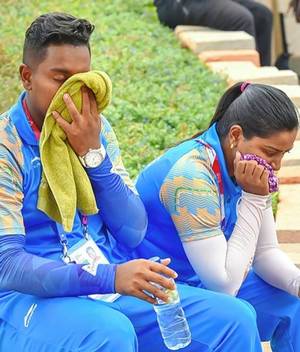
Photo: PTI
From: Deepika, Atanu exit from recurve mixed event, August 25, 2018: The Hindu
Lose to lower-ranked Mongolia in a shoot-out
India’s struggling recurve archers were in for more shock with Deepika Kumari and Atanu Das suffering an upset defeat at the hands of lower-ranked Mongolia in the Asian Games here via shootout. The 4-5 loss in the mixed team quarterfinals left the Indian squad shell-shocked as Deepika yet again floundered in pressure situation, finding a seven in the second shot of the shoot-off, which led to their ouster. Meanwhile, India’s compound team of Abhishek Verma and Jyoti Surekaha moved to the quarterfinal with a 155-147 win over Iraq’s Fatima Saad Mahmood and Eshaq Ibrahim Mohammed. They will next take on Iran.
2
India were assured of at least two more silver medals after the men and women’s teams progressed to the final of the compound archery team events on Sunday. The Indian men are the defending champions and they lived up to their reputation by getting the better of Chinese Taipei 230-227 in the semifinals. They had earlier defeated Qatar (227-213) and Philippines (227-226) on way to the semifinals and will play South Korea in a repeat of the 2014 Incheon Asiad title clash. Earlier in the day, Indian women beat Chinese Taipei 225-222 in the semifinals to progress to the gold medal match with Korea.
Athletics
100m, Women’s: silver
Dutee Chand ran a near-perfect race to help India bag a silver in women’s 100m Dutee is the first Indian since PT Usha in 1986 to finish second in women’s 100m and the first since India Rachita Mistryin 1998 to lay her hands on a medal in the marque event.
Dutee was quick off the block before picking up speed at the half-way stage to dominate the event, but Edidion Odiong of Bahrain pipped the Indian at the post with a late burst. Dutee had a timing of 11.32 with the Bahrain girl recording 11.30 sec for a photo finish.
It was a day of redemption for Dutee who had to face a lot of hardships and was even dropped from the Indian squad in 2014 for hyperandrogenism. She was later made ineligible for competition before being reinstated following a Court of Arbitration order.
200m, Women’s
Semifinals: Dutee Chand (enters final), Hima Das (DQ)
Dutee Chand, silver
Dutee Chand, silver
400m, Men’s
Biswajyoti Brahma, August 27, 2018: The Times of India
A fatigued Muhammad Anas came close to rewriting the record books It seemed that Anas had not recovered completely from the effort he had put in in the heats as well as the semis a day earlier. It had a telling effort on his performance in the final as he failed to finish on top of the podium. Anas still managed a timing of 45.69 sec, which was fractionally slower than the 45.31 he had done while setting the national record during the Commonwealth Games in April. “My body was tightening up after around 250 metres.”
Rajiv Arokia narrowly missed the bronze as he struggled with a cramp.
400m, Women’s
HIMA SETS NATIONAL MARK
Teen sensation Hima Das set a national record ; in the women’s 400m as she qualified for the final. She clocked 51 seconds in the semifinals and finished second behind Bahrain’s Salwa Eid Naser, who set a Games record at 50.86s.
Hima bettered the earlier national record set by Manjeet Kaur, in 2004 by 0.05 seconds.
Women’s 400m: silver
August 26, 2018: Business Standard
Hima broke the national record for the second time in as many days during her Sunday event. Hima ran at a scorching pace to finish second behind title favourite Salwa Naser of Bahrain, who won the gold with a Games record timing of 50.09 seconds. Hima finished with 50.79 sec, ahead of bronze winner Elina Mikhina of Kazakhstan (52.63). “I’m happy. I did not come here to run for medals but to improve my timing,” the 18-year-old athlete from Assam said.
Nirmala came fourth at 52.96.
4x400m relay, Mixed: silver
Stan Rayan, August 28, 2018: The Hindu
Final: 2. India.
Silver, 4x400m mixed relay
STAN RAYAN, The Hindu
India won a silver too on Tuesday, in the mixed 4x400m relay through Muhammed Anas, M.R. Poovamma, Hima Das and Arokia Rajiv, finishing behind Bahrain (3:11.89s) in 3:15.71s.
Though India had Anas in the opening leg, Bahrain beat the Indians comfortably for the gold. Hima, who ran the third leg, was sent off after a false start in the women’s 200m semifinal. That appeared to be a ‘strategy’ to keep her fresh for the mixed relay. Since her name figured in the day’s start list, a withdrawal would have made her ineligible to run in all subsequent races.
Later, India lodged a protest against Bahrain saying that the baton exchange between Poovamma and Hima was obstructed by a Bahraini runner.
800m, Men’s: gold, silver; history repeated after 67 years
Stan Rayan, August 28, 2018: The Hindu
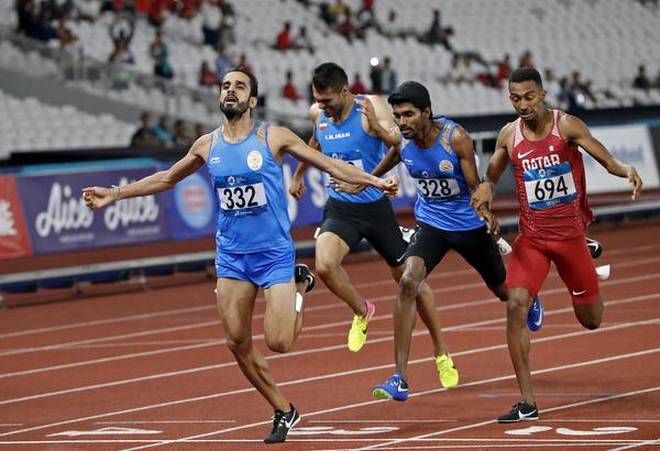
From: Stan Rayan, August 28, 2018: The Hindu
Final: 800m: 1. Manjit Singh, 2. Jinson Johnson;
Manjit Singh, gold, 800m.
Jinson Johnson, silver, 800m.
STAN RAYAN, The Hindu
As he left the last corner and entered the home straight, all eyes were on Jinson Johnson.
The 27-year-old had broken Sriram Singh’s 42-year-old national record a couple of months ago and on Tuesday evening, he appeared set to convert his Asian lead into his maiden Asian Games 800m gold at the GBK Main Stadium here.
But soon after Jinson had shifted gears to home-stretch mode and was trying to get past Qatar’s Abdalla Abubaker and Bahrain’s Abraham Rotich, the two Africans in West Asian garb, something strange happened.
There was an intruder at Jinson’s party!
That was Manjit Singh, Jinson’s Indian teammate, and he was running like crazy. Jinson could not remember when Manjit had last beaten him and here he was, coming from fourth spot and going past everybody, almost comfortably, and grabbing the gold.
It was the Games’ biggest shock, at least for the Indians. Just about a year ago, Manjit was running in the 1:48 range and here he was, taking gold in his debut Asiad in a personal best 1:46.15s with Jinson taking silver in 1:46.35, a rare one-two for India in the event at the Asiad.
The last time Indians had won Asiad gold-silver in the 800m was 67 years ago in the inaugural edition in New Delhi in 1951 through Ranjit Singh and Kulwant Singh
1500m
Qualification:
Jinson Johnson, Manjit Singh (enter final)
5000m, Women
Final:
5. L. Suriya, 7. Sanjivani Baburao Jadhav;
10,000m, Men’s
Biswajyoti Brahma, August 27, 2018: The Times of India
India lost out on a bronze in 10,000m as G Lakshmanan, who had finished third behind Chani Hasan and Abraham Cheroben, both of Bahrain, was disqualified for a lane violation. India later lodged a protest which was overruled.
20km walk, men
K.T. Irfan (DQ), Manish Singh Rawat (DQ)
20km walk, women
20km walk: 4. Khushbir Kaur, Soumya Baby (DQ).
Heptathlon, women’s
Swapna Burman, gold
Heptathlon: 1. Swapna Barman, 4. Purnima Hembram
Women: Final: 5000m
5. L. Suriya, 7. Sanjivani Baburao Jadhav;
Heptathlon, women’s
Swapna Burman, gold
Heptathlon: 1. Swapna Barman, 4. Purnima Hembram
Long jump, Men’s
Sreeshankar failed to return with a medal after finishing sixth in men’s long jump.
Triple jump, Men’s
Arpinder Singh, gold
Final: Triple jump: 1. Arpinder Singh, 6. A.V. Rakesh Babu
Other results
Biswajyoti.Brahma, August 26, 2018: The Times of India
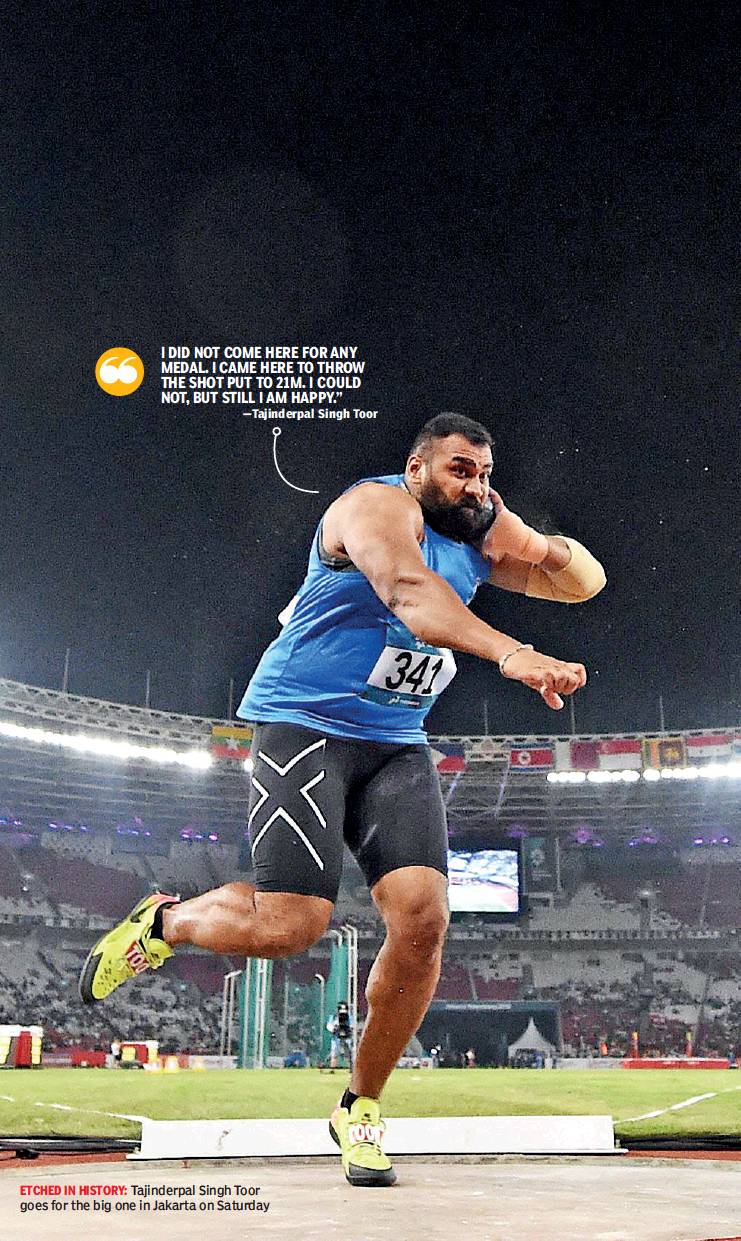
From: Biswajyoti.Brahma, August 26, 2018: The Times of India
Also qualifying for the 400m final was Nirmala Sheoran, who stood fourth overall with a timing of 54.09s.
National champion Dutee Chand, competing in her first big event after winning her gender case at the CAS, qualified for the semifinals of the women’s 100m with a timing of 11.38s on August 25, 2018.
Asian champion Mohammed Anas qualified for the men’s 400m final with a timing of 45.30s. Arokia Rajiv also joined him there by clocking 46.08 in the semifinals. Earlier Chetan Balasubramanya qualified for the final of high jump by clearing 2.15m. Making to the final of long jump was Sreeshankar with an effort of 7.83m, which was fourth best of the day. However, there was disappointment for Sarita Romit Singh, who finished fifth in the hammer throw after clearing a distance of 62.03m.
In the women 10,000m, Suriya Loganathan (32:42.08) and Sanjivani Baburao (33:13.06) faded towards the end to finish sixth and ninth respectively.
Dutee Chand topped her semifinal clocking 23s and entered the women’s 200m final as the fastest qualifier, while in the women’s 5000m, L. Suriya and Sanjivani Jadhav finished fifth and seventh respectively.
Badminton
Team quarterfinals: India knocked out
Biswajyoti Brahma, Shuttlers knocked out in team quarterfinals, August 21, 2018: The Times of India
PV Sindhu won her match but the rest faltered as the Indian shuttlers failed to put it across Japan and crashed out in the women’s team quarterfinals at the Asian Games. The Indian men’s team did no better, going down to Indonesia in the team quarterfinals later in the day.
Sindhu gave India a winning start in the first singles, beating Akane Yamaguchi in straight games in 44 minutes. The Indian, who enjoyed a 7-4 head-to-head advantage over the Japanese going into the match, was tested by her rival but she used her experience to prevail in the contest 21-18, 21-19.
India wasted the lead in the next match itself when their doubles pair of N Sikki Reddy and Arathi Sara Sunil went down tamely in the doubles 15-21, 6-21 in 34 minutes against Yuki Fukushima and Sayaka Hirota.
All hopes then rested on veteran Saina Nehwal to regain India’s lead, but she failed to deliver. After losing the first game in the match against Nozomi Okuhara 11-21, Sania made a spirited comeback taking the second game 25-23. But her rival ran away with the match in 71 minutes by taking the third game 21-16.
This was Saina’s second straight loss against Okuhara, who had beaten the Indian in the World Championships last year.
Sindhu later tied up with Ashwini Ponnappa in the fourth match, but failed to do much as Misaki Matsutomo and Ayaka Takahashi wrapped it up 21-13, 21-12 to dash India’s hopes. “They had a strong defence and had prepared well for this match. We tried hard, but it did not work out for us,” Sindhu said.
The men’s team also faced a similar fate as they went down against Indonesia 1-3, with HS Pannoy registering the lone victory for the Indians.
The Indians were caught on the wrong foot when their No. 1 player Kidambi Srikanth was stunned by Anthony Sinsuka 21-23, 22-20, 10-21 in just over an hour. The Indians failed to recover from that setback. They lost the next match, a doubles contest, by three games.
Prannoy delayed the inevitable by winning his tie against Jonatan Christie 21-15, 19-21, 21-19 but Indonesia sealed the issue by winning the doubles match that followed.
Women: silver
P.V. Sindhu, silver, singles, badminton.
P.V. Sindhu lost to Tai Tzu Ying (Tpe) 13-21, 16-21.
Other results
1
August 24, 2018: The Times of India
The spectators in the stands had sensed an upset and were vociferously rooting for the littleknown Thi Trang Vu in her opening match against PV Sindhu in the women’s singles at the Asian Games. The world No. 53 from Vietnam was playing like a dream and was very close to show the World No. 3 the door in the very first round itself.
With one-game all and 21-21 in the decider, it could have gone either way, but Sindhu used all her experience to salvage the situation – first forcing an unforced error by her rival before smashing the winner much to the relief of her supporters.
Sindhu was herself to be blamed for the predicament against an opponent against she had never played before. After winning the first game 21-10 in just 10 minutes, it was expected to be cakewalk for her. But her trouble started soon after that.
Errors crept into her game and she struggled to keep her returns in play while smashing others into the net. It was a capitulation of sort in the second game which Thi won 21-12. “I was making too many errors,” she admitted later. The third game was a see-saw battle with both players trying hard. But the turning point came when Sindhu hit a return at 21-20 and started celebrating thinking that she had closed the match, only to be disappointed when it was ruled out. “I was angry. I thought that was in. I asked the umpire but he said it was out,” Sindhu said.
But that was enough motivation for Sindhu to win the next two points to seal the issue.
Saina Nehwal, meanwhile, cruised to an emphatic 21-7, 21-9 win in 27 minutes against Soraya Aghaeihajiagha of Iran. The Indian did not break a sweat as she advanced without much fuss. In other matches, Ashwini Ponnappa and Sikki Reddy advanced in women’s doubles. The pair of Satwik Rankireddy and Chirag Reddy as well as Sumeeth Reddy and Manu Attri progressed in men’s doubles.
SRIKANTH, PRANNOY SUFFER SHOCK EXITS
Top Indian shuttlers Kidambi Srikanth and HS Prannoy were knocked out of the 18th Asian Games after suffering shock defeats in the second round of the men’s singles competition on Friday. After Srikanth lost 21-23, 19-21 to Wong Wing Ki Vincent of Hong Kong in a 43-minute duel, Prannoy too followed suit going down 12-21, 21-15, 15-21 to Thailand’s Kantaphon Wangcharoen in a 65-minute contest. However, Ashwini Ponnappa and N Sikki Reddy reached the quarterfinals with a thrilling 21-17, 16-21, 21-19 win over higher-ranked Malaysian combination of Chow Mei Kuan and Lee Meng Yean in women’s doubles.
2
Biswajyoti Brahma, August 26, 2018: The Times of India
It was a tricky match for Saina Nehwal. The Indian was not only playing against a competent shuttler, but she was also up against a stadium full of supporters who were shouting hoarse for the local girl, world No. 40 Fitriani. The feisty Indian did not let it affect her game as she advanced to the quarterfinals with a 21-6, 21-14 win.
After Saina’s win in the first match of the day, Sindhu defeated another Indonesian, world No. 22 Gregoria Mariska, 21-12, 21-15 to secure a last eight berth.
Saina got a taste of things to come when Fitriani won the first point of the match – the entire stadium tried to get under the skin of the Indian by cheering for the Indonesian loudly, making a lot of noises. It failed to distract the experienced Indian who went on to win the first game quite easily.
The Indonesia had the Indian on the backfoot in the second game by taking a 9-5 lead, but Saina upped her game to pocket the contest in 33 minutes.
Sindhu made a good start in her match, racing to a 7-0 lead in no time, leaving her rival to do all the catching-up in the first game. The Indonesian put up a slightly better display in the second game, but that was not enough.
All other Indians in the fray suffered losses. Commonwealth Games silver medallists Satwiksairaj Rankireddy and Chirag Shetty lost to South Korea’s Choi Solgyu and Min Hyuk Kang in men’s doubles. Manu Attri and Sumeeth Reddy also lost in men’s doubles while the pair of Ashwini Ponnappa and Sikki Reddy crashed out of women’s doubles competition.
3
Biswajyoti Brahma, August 27, 2018: The Times of India
Saina Nehwal and PV Sindhu ensured two medals for India in badminton, country’s first individual medals in the sport in 36 years, advancing to the semifinals of women’s singles at the Asian Games.
Both the players recorded hard-fought victories in their respective matches with Saina coming from behind to beat Ratchanok Intanon of Indonesia in straight games while Sindhu was stretched to the distance by Nichaon Jindapol, also of Thailand. India last won an individual medal in at the Asiad in 1982 when Syed Modi claimed a bronze at the Delhi Games.
Saina came to the match high on confidence having beaten former world champion Intanon in their four previous encounters with the latest win coming in the World Championships earlier this month. But she soon found herself looking down the barrel as the World No. 4 Thai raced to 12-3 lead.
Once she came back from the brink, there was no looking back as the world No. 10 raced to win the first game 21-18 before claiming second game 21-16 to book a semifinal clash with world No. 1 Tai Tzuying of Chinese Taipei.
World No. 3 Sindhu was on track for an easy win against world No. 12 Jindapol when she claimed the first game 21-11 in 17 minutes. But the game change its course as errors started to creep into her game and she struggled earn points.
He took the game 21-16. “I could have finished the match in two games. But I made many unforced errors in the second game, especially after taking a 6-3 lead,” Sindhu said. “I started getting nervous seeing that nothing was working for me. I had to keep my patience and just keeping going.”
She had to struggle to regroup herself in the third game before closing it 21-14 to win the match in 64 minutes.
4
Biswajyoti Brahma, Sindhu-Saina potboiler ends before climax, August 28, 2018: The Times of India
World No. 3 Sets Up Gold Medal Clash With Tzu Who Sees Off Senior Indian
PV Sindhu smashed one hard to the left of Akane Yamaguchi and raised her hands to celebrate. Was it one of those regulation celebrations? Sindhu had beaten the Japanese for the fourth time in five meetings this year; it was after yet another three-gamer and this time it was to secure her place in the women’s singles finals. In doing so, Sindhu became the first ever Indian to achieve the feat in the Asian Games.
The 21-17, 15-21, 21-10 win has ensured Sindhu a silver in the competition, but it could well have been double delight for India had Saina Nehwal’s straight-game loss against World No. 1 Tai Tzu Ying of Chinsese Taipei not besmirched the Indian run in the other semifinals. Saina will get bronze after losing 17-21, 14-21, despite coming up with an impressive game. But that was not enough against a player currently the best on the circuit based on form. Saina had to play catch-up for most of the match after Tzuying took off with quick points in both the games.
Despite the Japanese taking the first two points, Sindhu overtook her at 5-4 before extending the lead further at the break, 11-8, at the break. She picked two and three-pointers a few times to take the first game in 22 minutes.
The world No. 3 took control of the proceedings in the second game and raced to a 10-6 lead before the Japanese, staring at the prospect of missing out an on the final, upped her game and won six consecutive points. There was no stopping the world No. 2 as she clinched the game to take the match to the decider.
Sindhu employed more rallies, the longest being one with 62 shots in the decider to frustrate her rival and by the time of changeover had taken a comfortable four-point lead. Two set of straight five- pointers took her to the final.
This was her third match out of four at the Asiad where Sindhu has closed it after three games. In fact, playing three-gamers have become an almost regular feature of Sindhu in recent times.
Earlier, Saina, the lowest-ranked among the semifinalists at No. 10, had a marginally better second game against Tzu. She took the lead at 13-12, her first in the entire game, but after that could could earn just one point as against 9 taken by the Chinese Taipei player.
Boxing
Light Fly (49kg), Men
(Quarterfinals): Amit Panghal bt Kim Jang Ryong (PRK)
Fly (51kg): Women
Sarjubala Devi lost to Yuan Chang (Chn).
Light welter (64kg)
Dheeraj Rangi lost to Chinzorig Baatarsukh (Mgl)
Middle (75kg)
Vikas Krishan bt Tuoheta Erbieke Tanglatihan (Chn)
Other results
1
SIX BOXERS GET BYE INTO PRE-QUARTERs, August 24, 2018: The Times of India
Six Indian boxers, including two-time medallist Vikas Krishan and Sarjubala Devi, got byes into the prequarterfinals, while one got a direct entry into the last-eight stage after draws for the Asian Games were unveiled on Thursday.In the men’s draw, five out of seven in fray, got first-round byes.
2
August 25, 2018: The Times of India
Indian boxer Pavitra (60kg) advanced to the quarterfinals of the Asian Games after out-classing Pakistan’s Rukhsana Perveen in a bout that did not go beyond the opening round on Saturday. Pavitra was at her ferocious best in the contest resulting in two knockdowns for Rukhsana in the first round. After that, the referee stopped the contest in Indian’s favour 10-8.
3
August 26, 2018: The Times of India
SARJUBALA IN QUARTERS; MANOJ, SHIVA BOW OUT
Former world silver-medallist Sarjubala Devi advanced to the quarterfinals but Manoj Kumar and Shiva Thapa went out after pre-quarterfinal losses in the boxing competition on Sunday. Sarjubala, competing in the flyweight 51kg category, defeated Tajikistan’s Madina Ghaforova 5-0. Manoj went out after being bested by Kyrgyzstan’s Abdurakhman Abdurakhamanov in the welterweight 69kg category, while Shiva spent less than a minute in the ring before referee stopped the contest in favour of China’s Jun Shan in the lightweight 60kg category.
4
( Quarterfinals): Women:
Feather (57kg): Sonia Lather lost to Son Hwa Jo (PRK);
Light (60kg): Pavitra lost to Huswatun Hasanah (Ina).
Bridge
The team
Sometimes listening to your doctor’s poker-faced advice is the best hand you can play. Just ask Finton Lewis.
Told to “simply waste your time” four years ago by his doctor, Lewis did just that – or probably, completely misread the message. Today, that sage advice has led to one of the most interesting stories at the Asian Games here at Jakarta.
Lewis, a retired 64-year-old school teacher from Mumbai had just recovered from colon cancer and his doctor advised him to “enjoy life to the fullest”. Not really sure what to do, the lover of mathematics turned to a deck of cards, and a sport that his brother had introduced him to nearly four decades earlier. That was it and at 64, a potential Asian Games medal winner was taking shape.
As the bridge event got underway at the Asian Games here on Tuesday, Lewis could not be blamed for concealing a quiet chuckle as he peered over his cards. “What a fantastic way to waste your time,” he must have thought.
Bridge was the Sudoku of a time before the 1990s. Till the advent of online games at the turn of the century, bridge was what your fathers played after officehours and you secretly wished you could learn, and join.
Today, Lewis and Team India are hoping to take bridge back into the mainstream here at Jakarta. A podium finish, a medal around their necks wouldn’t hurt either.
Lewis is part of an eclectic 24-strong Indian mix at Jakarta. The wife of a former union minister and a few septuagenarians are part of the group.
At 79, Rita Choksi is the oldest member of the Indian contingent, and is the ‘elder’ in a squad with an average age of well over 50. Three years Rita’s junior, 76-year-old Vasanti Shah has problem moving around, but that doesn’t deter her from giving her best in India’s bid at the Asiad.
Hema Deora, 67, is the wife of former petroleum minister Murali Deora, while among the ‘younger’ lot, the dashing Jaggy Shivdasani (60) wants to inspire youngsters to break his 42-yearold national record in the sport. 48-year-old Himani Khandelwal and husband Rajeev Khandelwal
(54) are simply happy to soak in the indescribable” feeling of representing India.
The players see the Jakarta experience as an opportunity to drive home the message that bridge is a mind sport and not just another a card game.
Most players rued the fact that India is not producing enough young bridge players unlike in countries in Europe or like China and Singapore.
“For many in India, bridge is cards and cards means gambling,” Shivdasani told TOI on Tuesday, “But in reality, it’s not so and that perception needs to change,” he said.
“There is a need to make youngsters aware of this sport and the governments should promote it,” said Hema Deora, who sponsors several teams in different bridge competitions.
Vasanti Shah said she played bridge since it helped her stay alert. “It’s a passion for me. I picked it up quite early from my father, and I can feel the difference it can make to me even at this age. It helps me stay alert.”
Lewis says he’s saddened to see limited knowledge of the game in the country. “I would love to see the game grow. Right now, the spectator interest is very low,” he lamented.
Shivdasani is the current record holder in Indian bridge, being the youngest-ever national winner at 18 years. “I was a teenager when I won the national championship. Even after 42 years, that record stands. I would love for it to be broken,” he said.
Men’s team, mixed team: Bronze each
August 26, 2018: The Indian Express
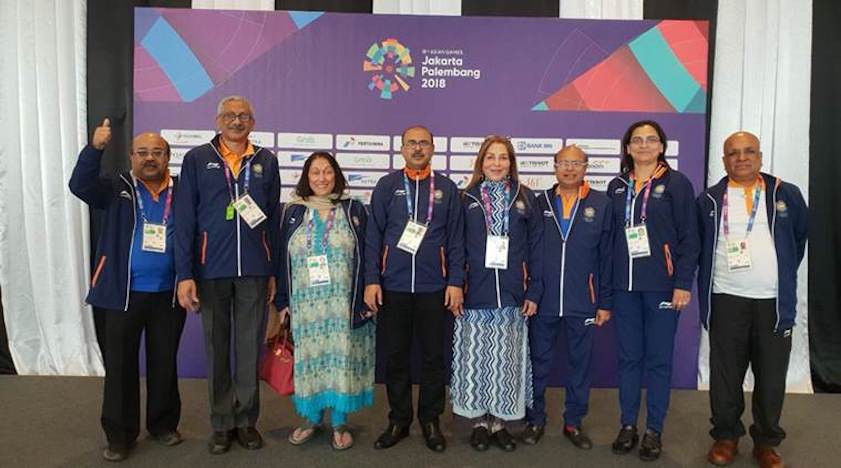
From: August 26, 2018: The Indian Express
India settled for two bronze medals from the debut sport of bridge in the Asian Games after the men and mixed teams lost their semifinal matches here. The men’s team lost to Singapore while the mixed team suffered defeat at the hands of Thailand. There is no bronze medal play-off.
After the qualification rounds, the men’s bridge team was placed fourth while the mixed team took the top spot. The super mixed team, however, had failed to qualify for the semifinals.
The six-member men’s team comprised Jaggy Shivdasani, Rajeshwar Tewari, Ajay Khare, Raju Tolani, Debabrata Majumder and Sumit Mukherjee. The mixed team is made up of Kiran Nadar, Hema Deora, Himani Khandelwal, Bachiraju Satyanarayana, Gopinath Manna and Rajeev Khandelwal. The men’s team has an average age of 52 while the mixed team has 57. PTI
Other results
August 25, 2018: The Times of India
India were assured of two medals in the debut sport of bridge in the Asian Games after the men’s team and mixed team reached the semifinals. After the qualification rounds, the men’s bridge team was placed fourth while the mixed team took the second spot. Both the losing semifinalists will win a bronze.
Canoe/Kayak
Sprint
Semifinals Kayak Four (K4) 500m men: Albert Selvaraj, Ching Ching
Singh Arambam, Naocha Singh Laitonjam, Prohit Baroi (enter final).
Kayak Double (K2) 1000m men
Ching Ching Singh Arambam & Naocha Singh Laitonjam (enter final).
Cycling
Track cycling
August 27, 2018: The Indian Express
TRACK CYCLISTS CRASH OUT
India began campaign in cycling track events in a disappointing note with their men’s and women’s sprint and pursuit teams failing to qualify for the final rounds. In the team sprint events, both the men and women finished seventh in the qualification round out of eight participants.
Indian men’s pursuit side finished at the bottom of the pile at 10th in the qualification round. The women’s side finished fifth in team pursuit.
Diving
Men’s synchronised 3m springboard:
Final: 6. Ramananda Sharma Kongbrailatpam, Siddharth Bajrang Pardeshi.
Equestrian
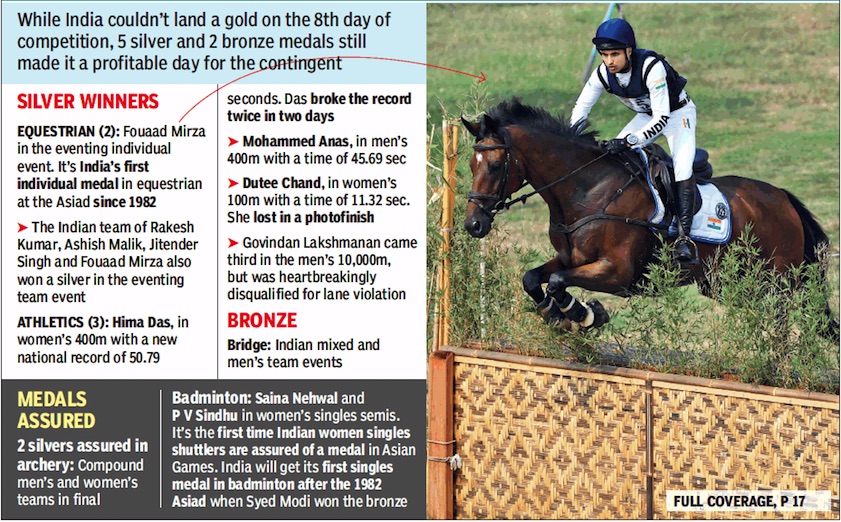
From: August 27, 2018: The Times of India
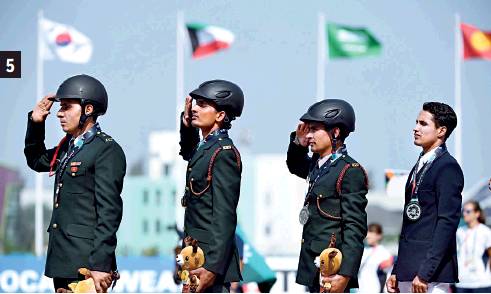
From: August 27, 2018: The Times of India
See graphics:
India's achievements on the 8th day of Asian Games in Jakarta (2018)- 5 silver and 2 bronze medals
Mirza, Jitender Singh, Akash Malik and Rakesh Kumar (equestrian, team eventing)
Individual eventing: Silver
Manuja Veerappa, August 27, 2018: The Times of India
Fouaad Mirza from Bengaluru created history by winning India’s first individual silver in equestrian at the Asian Games in 36 years. Mirza achieved the feat in the individual eventing competition with a score of 26.40. He lost the gold to Japan’s Oiwa Yoshiaki (22.70).
Until the night before his departure to Jakarta, Fouaad Mirza, much like the rest of his teammates, hadn’t received his accreditation. The team almost missed out on competing at the Asian Games. The federation, which picked the team in June this year, later claimed the selection was void. Subsequently, IOA dropped the team before a sevenmember contingent was cleared by the sports ministry.
Team eventing: Silver
Manuja Veerappa, August 27, 2018: The Times of India
Fouaad Mirza partnered with Jitender Singh, Akash Malik and Rakesh Kumar to claim the team event in the same competition with a combined score of 121.30 points.
Golf
Overall
August 26, 2018: The Indian Express
Indian golfers frittered away a good start with a poor third round and then followed it up with a modest show to finish seventh at the men’s team event. India’s best ranked player Rayhan Thomas (73) and Aadil Bedi (73) ended in tied 13th place while Kshitij Naveed Kaul (72) ended tied 23rd.
In the women’s section, Ridhima Dilawari finished tied 17th while Sifat Sagoo (73) and Diksha Dagar (72) were tied 22nd. PTI
Other results
1
August 24, 2018: The Indian Express
Kshitij Naveed Kaul produced a superb 68 as Indian golfers held on to the second position in men’s golf on Friday. India are 12-under after two days and second to Japan at 18-under. The Indian girls meanwhile are lying ninth.
2
August 25, 2018: The Indian Express
India’s medal chances in golf suffered a big jolt as all four players shot over-par in the third round of the men’s competition. Rayhan Thomas (73), Aadil Bedi (74), Kshitij Naveed Kaul (76) and Hari Mohan Singh (77) were left fighting on the back nine to salvage their rounds. India slipped to tied fifth place. In individual category, both Thomas and Bedi are only four shots behind second-placed Sadom Kaewkanjana of Thailand and Oh Seungtaek.
Gymnastics
‘Injured’ Dipa misses vault final
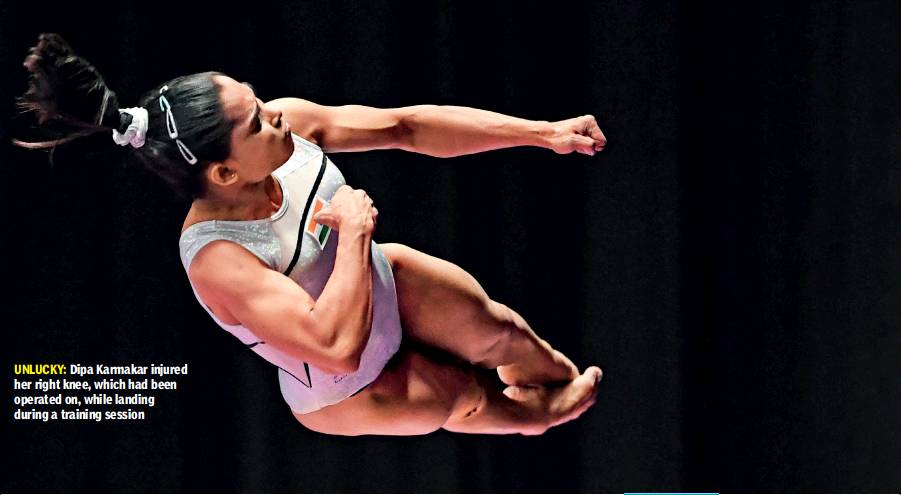
From: Biswajyoti Brahma, ‘Injured’ Dipa misses vault final, pulls out of team final, August 22, 2018: The Times of India
But Gymnast Will Take Part In Beam Final
Dipa Karmakar, who made an appearance in a multi-discipline event for the first time in two years, has pulled out of Wednesday’s women’s team final at the Asian Games after hurting her knee. Dipa hurt her right knee, on which she had undergone surgery for an injury, while landing during a practice session ahead of her participation in the women’s qualification for team and apparatus finals.
The injury did not allow the Indian to give her all in events on August 21, 2018 and she failed to qualify for the individual final in vault. Instead, her compatriots Budda Aruna Reddy and Pranati Nayak made the grade along with the team. The Tripura girl made it to the final in the individual beam event — not her forte — and will take part in that.
Women gymnasts finished seventh
August 23, 2018: The Indian Express
The Indian women’s gymnasts finished seventh in the team event final. For India, Aruna Budda Reddy and Pranati Das featured in all four apparatus while Pranati Nayak did in three, leaving the balance beam apparatus slot to Mandira Chowdhury. The team finished ahead of hosts Indonesia in the eight-team final with a score of 138.050.
Indian gymnasts finish at bottom
August 24, 2018: The Times of India
Aruna Budda Reddy and Pranati Nayak brought up the rear at seventh and eighth positions respectively in the women’s individual vault event final. Aruna had a fall in her first vault as she ended with the average score of 12.775. Pranati’s managed an average score of 12.650.
Other results
India’s star gymnast Dipa Karmakar left the Asian Games distraught, saying she had “a very bad feeling” as she departed Jakarta empty-handed.
The 25-year-old failed to make it to the podium in the balance beam, finishing fifth. That came after she was forced to pull out of the team final through injury and floundered in her favourite apparatus, the vault, missing out on qualification behind two of her teammates.
Handball
Men
1
INDIAN MEN LOSE TO CHINESE TAIPEI IN HANDBALL, August 26, 2018: The Times of India
The Indian men’s team lost narrowly to Chinese Taipei in a group 3 match of the handball competition India, who had earlier defeated Malaysia and Pakistan in group 3, lost 31-35 to Chinese Taipei. PTI
2
Men: Main round: Group 3: India bt Indonesia 37-23.
Women
August 25, 2018: Business Standard
The Indian women’s handball team ended its campaign on a winning note by beating Malaysia to finish ninth at the 18th Asian Games on Saturday. India thrashed Malaysia 54-19 in their final match of the competition.
Hockey
August 21, 2018: The Times of India
The Indian hockey team started its campaign at the Asian Games with a 17-0 mauling of hosts Indonesia in a Pool A men’s hockey match as the defending champions chose the contest to test their preparedness for tougher matches. India pumped in goals at will against the hapless hosts with Dilpreet Singh, Mandeep Singh and Simranjeet Singh scoring three apiece. Coach Harendra Singh later said the match helped India get used to the playing conditions in the tournament. “The score does not matter in this match as it was not about how many goals we scored. It helped us to read the pitch and the conditions. We also experimented with our game through
Men
1
August 21, 2018: The Times of India
The Indian hockey team started its campaign at the Asian Games with a 17-0 mauling of hosts Indonesia in a Pool A men’s hockey match as the defending champions chose the contest to test their preparedness for tougher matches.
India pumped in goals at will against the hapless hosts with Dilpreet Singh, Mandeep Singh and Simranjeet Singh scoring three apiece
2
India won by a record 26-0 margin against Hong Kong. India’s biggest win in international hockey came 86 years ago -- in 1932 Olympics when India outclassed USA 24-1 margin. To put the numbers in perspective, India had scored 18 goals in their four pool games in the Incheon Asiad 2014.
3
Biswajyoti Brahma, August 25, 2018: The Times of India
Rupinder Pal Singh scored twice to take his tournament tally to nine as Indian men’s hockey team came up with a commanding performance to beat Japan 8-0 in a Pool A match.
After two wins by huge margins in their first two matches – 17-0 against Indonesia and 26-0 against Hong Kong, this was a relatively tougher match for the defending champions. But still, it was way too easy for India against the World No. 16. They were not tested much by the Japanese. India’s goalkeeper PR Sreejesh, who spent 46 minutes on the turf, came under attack only a few times during the entire duration.
This is the third straight match in which India did not concede a goal and strengthened their position at the top of the table with nine points. This was Japan’s first loss after winning their first two games – against Sri Lanka and Indonesia. Rupinder’s form is important for India in their bid to win the title and book a berth for the 2020 Tokyo Olympics, and the drag-flick expert, returning to the squad after recovering from a hamstring injury, did not disappoint. On Friday, he struck twice – first through a penalty corner and later converting a penalty stroke.
The player returned to the squad one month back after spending six months on the sidelines due to injury. “Injuries are part and parcel of sports, but the teammates and coaches are helping me a lot. I am now fully fit and ready for the challenges at the Games.”
Rupinder, who scored twice against Indonesia in India’s opening match before slamming home five more against Hong Kong, admitted that India missed many opportunities to score on Friday and must sort out the issue in coming matches. “We could not take many chances that came our way. If we have to win regularly, we have to make use of these scoring opportunities.”
The other scorers in the matches were SV Sunil (7th minute), Dilpreet Singh (12th), Mandeep Singh (32nd, 57th), Akashdeep Singh(46th) and Vivek Sagar (47th).
In other Pool A matches, South Korea drubbed Indonesia 15-0 while Sri Lanka beat Hong Kong 4-1. In Pool B, Oman defeated Thailand 2-0, Bangladesh lost to Malaysia 0-7 and Pakistan trounced Kazakhstan 16-0.
4
August 26, 2018: The Times of India
Defending champions India continued their unbeaten run and beat South Korea; in a pool match to storm into the semi-finals of the men’s hockey competition.
India scored through Rupinder Pal Singh (1st minute), Chinglensana Singh (4th), Lalit Upadhyay (15th), Manpreet Singh (49th) and Akashdeep Singh (55th), while Korea’s goals came from the sticks of Manjae Jung (33rd, 35th) and Jonghyun Jang (59th).
By virtue of this result, India are leading in Pool A with 12 points from four victories. The title holders will play lowly Sri Lanka in their last pool engagement. Even though it was India’s fourth consecutive win in the pool, it was a far from impressive display from Harendra Singh’s men against the Koreans.
In their previous three games, the Indians had thrashed Indonesia 17-0 before registering a record 26-0 win over Hong Kong China and 8-0 victory over Japan.
Going by international ranking, the gulf between world no.5 India and their no.14 opponents was quite evident in the first two quarters, but the Koreans gained confidence after the change of ends, and surprisingly, controlled the game in the third quarter.
But it was India who started with a bang and scored as early as the opening minute when Rupinder scored from the spot after being awarded a penalty stroke. The Indians continued to press hard and doubled their lead in the fourth minute. PTI
5
India bt Sri Lanka 20-0.
Akashdeep Singh scored six while Rupinder Pal Singh, Harmanpreet Singh and Mandeep Singh scored three apiece against the minnows.
Women
1
August 22, 2018: The Times of India
A ruthless Indian women's hockey team today mauled lowly Kazakhstan 21-0 to notch up their second biggest win at the Asian Games here. Goals rained thick and fast in the Pool B match at the GBK Hockey Field with as many as 10 Indians out of 18, who took the field, entering their names in the scoresheet.
The Indians scored almost at will against the hapless Kazakhstan team but the scoreline missed their all-time Asian Games record of 22-0 by a goal. The Indian women's team had beaten Hong Kong 22-0 in the 1982 Asiad. Drag-flicker Gurjit Kaur, who had also scored a hat-trick in India's 8-0 thrashing of Indonesia in their opening match, top-scored again with four goals in the eighth, 36th, 44th and 52nd minutes.
Lalremsiami (9th, 19th, 29th), Navneet Kaur (11th, 12th and 49th) and Vandana Katariya (29th, 37th and 52nd) were the other three hat-trick scorers. Navjot Kaur (16th and 54th), Lilima Minz (38th and 44th), Neha Goyal (10th), Udita (34th), Deep Grace Ekka (43rd) and Monika (55th) were the other goal scorers for India in the completely lop-sided match with Kazakhstan defending all through.
India, who had won a bronze in the 2014 Asian Games, are currently ranked ninth while Kazakhstan are 34th in the latest FIH chart. India is the highest ranked team in the competition.
2
August 25, 2018: The Times of India
Hockey women book semis spot
Gurjit Kaur struck twice as the Indian women’s hockey team beat title holders South Korea 4-1 to register its third consecutive win and also book a place in the semifinals of the Asian Games here on Saturday. India scored three goals in as many minutes in the fourth quarter to emerge winners in the Pool B encounter after both the sides were locked at 1-1 till the 53rd minute.
Navneet Kaur gave India the lead with a field strike in the 16th minute which was neutralised by Korea’s Yurim Lee (20th) by converting a penalty stroke.
With both the sides desperately searching for the winner, Gurjit (54th, 55th) converted two penalty corners for India before Vandana Katariya (56th) scored a field goal to take the game away from the Koreans.
World No. 9 India were by far the better side on display as they controlled the proceedings for most part of the game.
The Koreans, ranked 10, on the other hand, played well in patches and relied more on counter attacks to stun the Indians. PTI
3
Having already qualified for the semifinals, India decided to play it safe in their last league match against Thailand but still won 5-0 in the women’s hockey competition at the Asian Games.
Skipper Rani Rampal, returning after missing two games due to injury concerns, found the net thrice while Monika and Navjot Kaur scored once apiece to help India finish the league stage with four wins from as many matches.
Though it was expected to be a cakewalk for India, who have scored as many as 38 goals so far, they failed to take lead in the first half. Their first goal came seven minutes into the third quarter while Rani scored a field goal. While coach Sjoerd Marijne said that India’s performance was a measured one, captain Rani conceded that Indian needed to show more pace in the first half.
Marjine said Rani, who suffered a back and hip injury during India’s opening match, was shaping up well for the matches ahead after the rest.
Javelin
Men’s javelin: gold
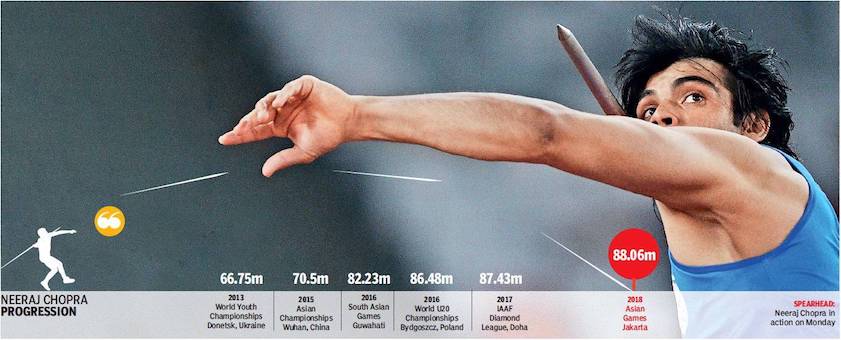
From: Biswajyoti Brahma, Neeraj Chopra wins Asiad javelin gold with a national record, August 28, 2018: The Times of India
Neeraj Chopra added yet another feather to his burgeoning young career with a thumping win in the men’s javelin – his 88.06m far and wide beyond the second- placed 82.22m by China’s Liu Qizhen, and Arshad Nadeem of Pakistan, who took bronze. It was the sixth best throw of the season, bettering the national record he himself set earlier this year – 87.43m at the Doha Diamond League in May. On August 27, 2018, it seemed so effortless, so easy, almost as if he were flinging toothpicks into the air and they were landing where he wanted them to. Yet, we knew of the magnitude of the 20-year-old’s effort when he still missed the Games record by a mere 1.09m, set by Liu’s countryman, Zhao Qinggang with his 89.15m at the 2014 Incheon Games.
Women’s javelin
Stan Rayan, August 28, 2018: The Hindu
6. Annu Rani.
Annu Rani, whose last-minute backdoor entry into the Indian team turned into a big controversy, was way below her best (personal best 61.86m) as she finished sixth with 53.93m.
Kabaddi
August 22, 2018: The Times of India
The Indian men’s and women’s kabaddi teams secured emphatic wins to qualify for the semifinals of the Asian Games here on Tuesday. The men’s team, a seven-time goldmedallist, bounced back from the shock 23-24 defeat against South Korea to beat Thailand 49-30 in their fourth and final Group A match. They had beaten Bangladesh 50-21 and Sri Lanka 44-28 before losing to South Korea. In the women’s competition, India played two matches and emerged victorious in both to top Group A with an all-win record to qualify for the semifinals.
Other results
August 22, 2018: The Times of India
The Indian men’s and women’s kabaddi teams secured emphatic wins to qualify for the semifinals of the Asian Games here on Tuesday. The men’s team, a seven-time goldmedallist, bounced back from the shock 23-24 defeat against South Korea to beat Thailand 49-30 in their fourth and final Group A match. They had beaten Bangladesh 50-21 and Sri Lanka 44-28 before losing to South Korea. In the women’s competition, India played two matches and emerged victorious in both to top Group A with an all-win record to qualify for the semifinals. PTI
Men: India gets bronze, misses final for 1st time
August 24, 2018: The Times of India
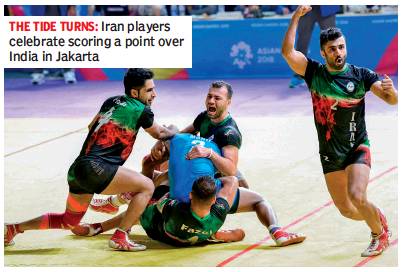
From: August 24, 2018: The Times of India
India’s reign as the men’s kabaddi champions of the continent was ended by a spirited bunch of Iranians who scripted a memorable win to book their berth in third straight Asian Games final.
It was a disjointed effort by the Indian team who struggled against their more organised rivals who used the techniques of the game more effectively to send the seven-time Asiad champions packing with the 27-18 win. This is for the first time that India, who would take home the bronze for reaching the semifinals, would not be playing in the final since the introduction of the Games in the Asiad in 1990 in Beijing.
Ironically, several members of the both Korean and Iranian teams have honed their skills in the Pro-Kabbadi League of India. They put into use their league experience at the Asiad much better than the defending champions. India paid the price for being over-confident, as admitted later by the team management.
Women: silver
Biswajyoti Brahma, August 25, 2018: The Times of India
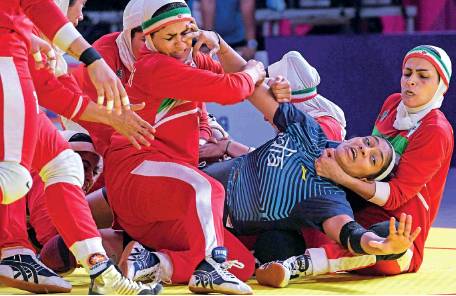
From: Biswajyoti Brahma, August 25, 2018: The Times of India
1
The Indian women’s team kept the tricolour flying by booking their third Asiad final with a 27-14 win over Chinese Taipei. The women’s team, which had won both the titles since the game’s introduction in 2010, will meet Iran in the final. After starting their campaign on a winning note against Sri Lanka, the men’s team had slumped to a shocking defeat against South Korea in their next match, indicating that not all was not well. But they failed to learn from the loss and came up with a sloppy show in the semifinals against Iran.
2
The women’s kabaddi team could go just one step further than the men. No more. The defending champions were stopped in their tracks 24-27 in a thrilling final here on Friday. The loss ended India’s bid for a third straight women’s kabaddi gold and it rankled as it came just a day after the Indian men were shown the exit door – again by Iran.
The girls settled for silver as against the bronze won by the men.
Backed by a capacity crowd consisting mostly of Indians, the defending champions were off to a good start and pocketed couple of early points with an aggressive approach to make their intentions clear. They dominated the first half and went on to take a comfortable 13-8 lead just before the breather. Things, however, changed dramatically for them in the second half as the Iranians came out stronger, taking a series of points.
The Iranians secured nine straight points to turn the match on its head as the Indians struggled to stop their rampaging rivals and slumped to 13-17. Pushed against the wall, the Indians tried hard to regain control of the match, but they were thwarted in their bid every time they attempted to reduce the margin. With a minute to go in the 40-minute match, Sakshi got a two-pointer plus a bonus point to raise hopes as the Indians managed to close the gap to 24-25. But Iran quickly added two more points through their raiders to dash India’s hopes of winning a third title.
The Iranian women benefitted from the experience of their Indian coach Shailaja Jain, whom they carried on their shoulders while taking the lap of honour. Shailaja, who retired as coach from Maharashtra state sports department, was associated with the Iranian women’s team for one and half years. “I am happy as well as sad as Iran won but India lost. But I will be going back with the gold medal I won with the Iranian girls.”
Karate
August 27, 2018: Business Standard
India’s campaign in the Asian Games karate ended with Jayendran Sharath Kumar and Vishal losing their respective contests. While Kumar suffered a 0-1 defeat against South Korea’s Kim Muil in men’s 75kg first round, Vishal was thrashed 0-8 by Uzbekistan’s Akhatov Shakhboz in the 84kg quarterfinal
Kurash
Women: 52kg: silver, bronze
Pincky Balhara, silver, women’s 52kg category, kurash.
Malaprabha Jadhav, bronze, women’s 52kg section, kurash.
Final: Pincky Balhara lost to Gulnor Sulaymanova (Uzb);
Semifinals: Malaprabha Yallappa Jadhav lost to Gulnor Sulaymanova (bags bronze).
Rowing
Men’s quadruple sculls: Gold
Biswajyoti Brahma, August 20, 2018: The Times of India
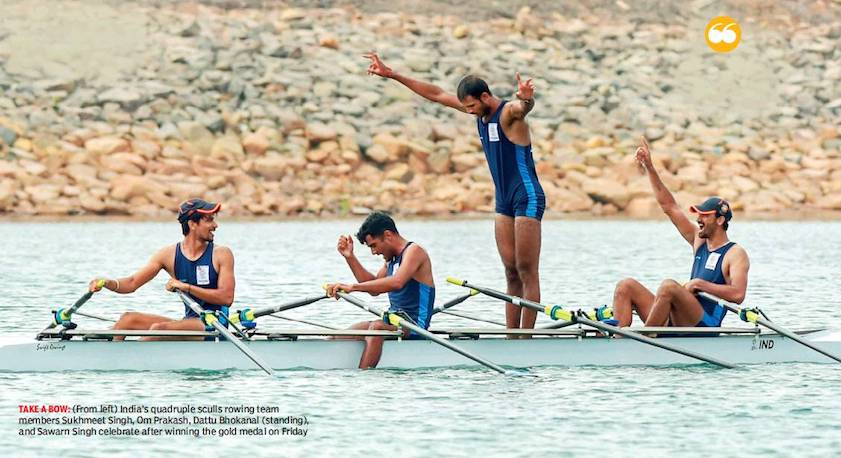
From: Biswajyoti Brahma, August 20, 2018: The Times of India
1
Dushyant and men’s quadruple sculls team in finals:Dushyant Chauhan and the Indian men's quadruple sculls team finished first in their respective heats to reach the finals of the rowing competition here on Monday. Dushyant clocked 7:43.08 to emerge the fastest in heat 1 and second overall behind South Korea's Hyunsu Park, who recorded 7:22.08. Starting off in lane 4, the quartet of Sawarn Singh, Dattu Baban Bhokanal, Om Prakash and Sukhmeet Singh qualified comfortably for the final, clocking 6:15.18 seconds. They finished the fastest overall.
2
The four-member team led by Olympians Sawarn Singh and Dattu Bhokanal scripted history for Indian rowing winning gold in men’s quadruple sculls at the Asian Games in Palembang on Friday. The gold won by the team of Sawarn, Dattu, Om Prakash and Sukhmeet Singh was India’s first ever medal in the quadruple sculls at the Games. The quadruple team, which had topped its heat on Monday, had a slow start as Indonesia took the lead. The Indians trailed till the 1000m of the race before overtaking the hosts and maintained their lead to bag India’s first gold medal in rowing in this edition.
The rowers knew they had the added pressure on Friday due to their medal-less show on Thursday, with favourite Dattu Bhokanal finishing last in the single sculls final. “ Senior rower Sawarn Singh, a bronze medallist in singles sculls four years back, was elated at having won the gold following a tough phase in life where a back problem had forced him to think about retiring. “It’s a comeback of sorts for me after enduring a tough phase due to a bulge in the spine. I had given up hope of playing for India again. But the rowing federation helped me recover with proper treatment. This win has come at the right time,” added the 28-year-old.
Rowing federation wants foreign coach Nicolae Gioga removed
Despite India winning a gold and two bronze in the rowing competition, the team’s Romanian coach Nicolae Gioga’s days with the national team look numbered. Gioga, who had earlier coached countries like China and Iran before taking charge in India late last year, is all set to be removed because the Rowing Federation of India (RFI) is not happy with the way he functions and his poor relationship with the rowers. “He will no longer be the coach of the Indian team,” life president of RFI, CP Singh Deo, told TOI on Friday. “We never wanted a foreign coach in the first place, but he was imposed on us. We could have won more medals at the Asian Games had he not been the coach,” he said.
Men’s lightweight single sculls: bronze
The bronze medal was won by Dushyant
Men’s lightweight double sculls: bronze
The bronze medal was won by the duo of Rohit Kumar and Bhagwan Singh
Dattu falls ill, finishes last
Kumaraswamy K, August 24, 2018: The Times of India
India’s rowing campaign at the Asian Games began to unravel with Army oarsman Dattu Bhokanal coming home eighth and last in men’s single scull final after tumbling into the water before the race, and then fading out with a poor performance.
Bhokanal, who had topped the repechage to qualify for the medal race, clocked 8 minutes 28.55 seconds to bring up the rear in the medal match at the Jakabaring lake. The Nashik rower had earlier timed 8:09.21 in the qualifying heats and 7:45.71 in the repechage.
China’s Liang Zhang (7:25.36) won the gold ahead of Korea’s Kim Dong Yong (7:30.86) and Ryuta Arakawa (7:35.29). But more than the margin, it was the manner of defeat that has brought a pal of gloom on the Rio Olympian as well as the whole Indian contingent.
First, Dattu fell into the water while beginning his warm-up lap. It must be noted that the 27-year-old comes from the water-scarce region of Nashik in Maharashtra and doesn’t know swimming.
Apparently, India’s best rower had contracted a virus from fellow oarsman Dushyant Chauhan (both share the same room) and had been suffering from “respiratory” problem for the last two days. The illness is suspected to have caused dizziness, resulting in his fall. Then, during the race, Dattu “forgot to close the oarlock gate” before the start. This elementary error, combined with his illness, saw him come up with a forgettable performance.
For India’s head coach Nicolae Gioga of Romania, it was a nightmare come true.
“Rowing is an endurance sport and athletes need perfect health of the respiratory system,” Gioga said from Palembang. The 66-year-old, who had guided his national women’s teams to back to back Olympic gold in 1996 and 2000, had talked about a “strange illness” afflicting the Indian rowers during the national camp at the Army Rowing Node in Pune.
Dattu and Dushyant, as well as 2014 bronze medallist Sawarn Singh, had suffered from frequent illness, hampering their preparation. In fact, Dattu had complained of shoulder strain and knee pain, which are not common to rowers. There were murmurs in the ARN corridor that the rowers were finding it tough to cope with the tough training regime put in place by Gioga.
Rules allow 50 percent of a team to be changed two hours before the race.
Other results
1
August 22, 2018: Business Standard
Indian rowers continued their good show in the 18th Asian Games as they qualified for the final round in three more events here today. Rohit Kumar and Bhagwan Singh finished on top in men’s lightweight double sculls repechage round with a time of 7:14.23s to qualify for the final race to be held on August 24. In the women’s four repechage round, the Indian quartet of Sanjita Dung Dung, Annu, Navneet Kaur and Yamini Singh finished fourth with a time of 7:53.29s but still made it to the final to be held on August 24.
The men’s lightweight eight team was the last to compete today and it also qualified for the final race by coming on top with a time of 6:15.62.
2
August 25, 2018: The Times of India
Indian rower Sayali Shelake, who competed at the 18th Asian Games, will have to stay in Palembang for another seven days after undergoing an operation for intestinal blockage. Shelake was hospitalised onafter she complained of pain in the abdomen.
Sailing
Other results
Fleet overall after race 9:
Laser radial: 5. Nethra Kumanan;
Open laser 4.7: 3. Govind Bairagi, 4. Harshita Tomar.
Fleet overall after race 11:
49er men: 3. Varun Ashok Thakkar, Ganapathy Chengappa;
49er FX women: 2. Varsha Gautham, Sweta Shervegar;
Mixed RS One: 8. Katya Ida Coelho, Dayne Edgar Agnelo Coelho.
Sepak takraw
August 20, 2018: The Times of India
India were assured of a maiden Asian Games medal in sepak takraw by progressing to the semifinals with a win over Iran, here. India defeated Iran 21-16, 19-21, 21- 17 in the first match to make a winning start to their campaign. They, however, lost to Indonesia 0-3 in the second match in men’s team Regu (team competition) Preliminary Group B but advanced to the last-four stage to be guaranteed of at least a bronze.
Win over Iran
India were assured of a maiden Asian Games medal in sepak takraw by progressing to the semifinals with a win over Iran, here. India defeated Iran 21-16, 19-21, 21- 17 in the first match to make a winning start to their campaign. They, however, lost to Indonesia 0-3 in the second match in men’s team Regu (team competition) Preliminary Group B but advanced to the last-four stage to be guaranteed of at least a bronze.
India secure historic bronze
August 22, 2018: The Times of India
It was a ‘victory in defeat’ for the Indian men’s sepaktakraw team which settled for its maiden Asian Games bronze medal after being beaten by a formidable Thailand in the semifinals here on Tuesday. The Indian men’s regu team lost to Thailand 0-2 but picked up a bronze as both the losing semifinalists are also awarded a medal.
Sepaktakraw, which directly translates to kick the ball, has been part of the Games program since 1990. India has participated since the 2006 edition and is slowly catching with the South East Asian countries, where the sport has a huge following. Thailand has won a whopping 22 gold medals at the Games and Myanmar is a distant second in the list with five gold.
The Indian team was training in Thailand for the past two months and that made a huge difference, according to chief coach Hem Raj. “The only way is up for these boys. The government has put us in the priority sport list and we will continue to repay their faith with good performances,” an ecstatic Raj said.
Eight of the 12 members of the squad are from Manipur and the rest from Delhi. The sport is quite popular in Manipur, primarily because of its proximity to Myanmar. “Yes, that is how the sport became so popular in Manipur. It is close to Myanmar and it has always been easy to source equipments from there. Now we use synthetic balls but back in the day, we used to get balls made of bamboo. That was the traditional way of playing the sport,” said another team official Muhindro Singh Thokchom.
Football is also popular in the Northeast and that is another reason why most India players are coming from that region, including captain Niken Singh and Alaksh Yumnam, the acrobatic striker who earlier used to play the ‘beautiful game’. “Compared to people from the other parts of India, people from Manipur pick up the sport faster. They are naturally agile and very skilful with their feet. But slowly the game is getting popular in other parts of the country too,” added Thokchom.
The men’s team is not done yet and promises another medal in regu. The women’s team failed to win a medal but they too are improving fast.
Sepak takraw regu
The Indian men’s sepaktakraw regu team lost to South Korea in a group match. India lost 0-2 (6-21, 7-21) to South Korea in their opening men’s regu preliminary Group B match.
Women’s Quadrant
Japan bt India 2-0.
Other results
INDIA BEAT NEPAL 2-0 IN SEPAK TAKRAW
Already out of reckoning, Indian men ended their campaign on a positive note, beating Nepal 2-0 in the last group B regu match of Sepak Takraw competition on Monday. India, comprising Rupesh Sunar, Dipesh Jung Thapa, Govinda Magar, Sanjeet Dhimal and Rabin Bhattarai, beat Nepal 21-5, 21-15 in the Group B match
Shooting
Air pistol 10m
Biswajyoti Brahma & Ishita Bhatia, August 22, 2018: The Times of India
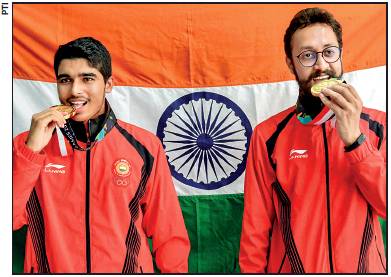
From: Biswajyoti Brahma & Ishita Bhatia, August 22, 2018: The Times of India
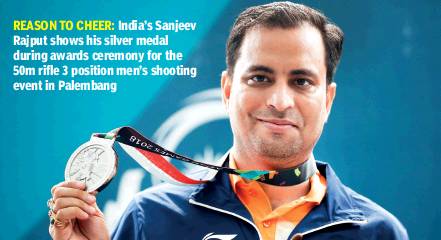
From: Biswajyoti Brahma & Ishita Bhatia, August 22, 2018: The Times of India
Chaudhary’s gold came after a thrilling contest with a former world champion — Japan’s Tomoyuki Matsuda — who dominated the final and led all the way till the penultimate shot. After an average start in the final, during which he came up with three straight sub-10 shots, the Indian shot 10-plus scores consistently to bridge the gap between him and the leader.
Chaudhary, who began the final 1.9 points behind the Japanese, brought the difference down to just 0.4 before the final two shots.
An 8.9 at a crucial juncture by the Japanese handed the lead to the Indian who closed the contest with shots of 10.2 and 10.4. Matsuda’s 10.3 in the final shot had no impact on the outcome as the Japanese finished one point behind to take silver. London Olympic gold medallist Jin Jongoh of South Korea finished fifth.
Another Indian, 29-yearold Abhishek Verma, also a first-timer at a major event, finished third to claim bronze. Chaudhary aggregated 240.7 while Verma had a total of 219.3 in the final.
Air pistol 25m, women’s, Gold
Biswajyoti Brahma , August 23, 2018: The Times of India

From: Biswajyoti Brahma , August 23, 2018: The Times of India
Rahi Sarnobat kept her cool during the rare double shoot-off in the final to claim the gold medal in the women’s 25m air pistol event at the Asian Games, the feat making her the first Indian woman to claim a shooting gold in the continental event.
Air pistol, women’s 10m: bronze
Tushar Dutt, August 24, 2018: The Times of India
The monkey is off Heena Sidhu’s back. The pistol shooter, who went to the Asian Games in the backdrop of a selection controversy, won bronze in women’s 10m air pistol final in Palembang.
Shooting an average qualification round, the former No. 1 qualified seventh for the final with a score of 571. In the final, Heena didn’t get an ideal start and lurked in the 5th position before attending to her pistol that needed some tweaking. Once the pistol was recalibrated, Heena shot a few 10s to jump to third position. She shot 219.2 after 22 shots to settle for the third position.
Another Indian in the fray, Manu Bhaker, remained medal-less once again, as she finished fifth with 176.2 on board. She had qualified third with a score of 474. From an average start to a medal finish, a lot happened in between for Heena. She admitted she was under pressure due to the controversy related to her omission from mixed team event.
This, however, wasn’t easy. Heena’s pistol gave her trouble during the final. She suspected wrong calibration as a reason, but didn’t dare to tweak the pistol as she feared early elimination.
“Shooters normally aim a little below the centre as it is the best position to hit 10s. During the sighters (practice shots) in the final, all my shots were making a group towards the left of the target. I thought it would be okay once I took a few shots. But even after my best efforts, my best shots were 9s,” she explained.
Double trap: silver
15-year-old Shardul Vihan made the nation proud.
Vihan, a Class IX student who like Chaudhary hails from a Meerut village, won the silver in double trap at the Palembang ranges, holding the shotgun with the ease of a veteran. A slight error in judgment cost him the gold in the end but he still made history, becoming the youngest Indian to win a shooting medal at the Asiad.
After a brilliant qualification round, where his total of 141 was two more than the next competitor, Hamad Ali Al Marri of Qatar, Vihan dominated for most of the final. However, he ended up conceding the lead to 2014 Incheon Asiad double trap team bronze medallist Hyunwo Shin of South Korea. Vihan’s final score of 74 was just one short of Hyunwo’s 75.
“I had taken the lead in the final, but did not realise when I fell behind. In the end I thought I had tied the score and there would be a shoot-off. But then I realised that he (Hyunwo) was alone at the top,” Shardul said.
Shardul Vihan finished just one point behind the gold medallist, Hyunwo Shin of South Korea
Men’s trap: silver
LAKSHAY BAGS SILVER IN MEN’S TRAP, August 21, 2018: The Times of India
Young shooter Lakshay Sheoran punched above his weight to clinch a silver in the men’s trap competition at the Asian Games here on Monday. Lakshay, who came up the junior ranks to be in his first international year as a member of the senior squad, shot down 43 targets out of 50 in the final.
The 20-year-old had managed to hit 119 out of 125 targets in the qualification round. Lakshay jointly led after 16 shots in the final, but eventually lost to Chinese Taipei’s Kunpi Yang, who equalled the world record to emerge triumphant.
Rifle mixed team
August 20, 2018: The Times of India
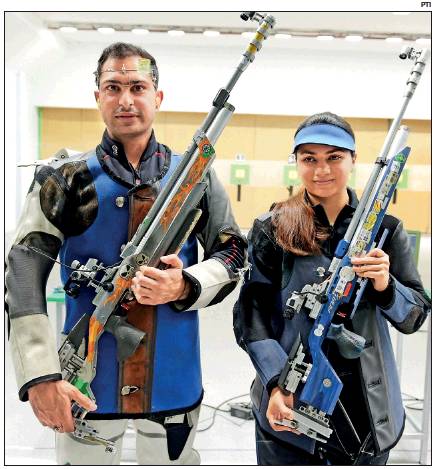
From: August 20, 2018: The Times of India
India opened their account in the 18th Asian Games with a bronze medal after Apurvi Chandela and Ravi Kumar cracked under pressure to finish third in the rifle mixed team shooting event. The Indians aggregated 429.9 after 42 shots in the 48-shot final and were in second spot for major part of the 48-shot finals before China overtook them to take the silver. The strong Chinese pairing of Ruozhu Zhao and Haoran Yang ended with a score of 492.5. Chinese Taipei’s Yingshin Lin and Shaochuan Lu claimed the gold, scoring 494.1.
It was a maiden Asian Games medal for Chandela, who will be aiming for a better colour medal in the 10m air rifle. Chandela is also a multiple time World Cup winner and had bagged gold at 2014 Commonwealth Games in Glasgow. World Cup bronze medallist Kumar, who is mentored by the great Abhinav Bindra, had won a men’s 10m rifle team bronze at last the edition at Incheon.
Overall: 3rd
India’s shooting campaign at the Asian Games ended on a disappointing note after four skeet participants failed to qualify for the finals. Sheeraz Sheikh and Angad Vir Singh Bajwa finished 13th and 14th respectively on day two of the qualification, failing to make the finals.
In women’s skeet, Ganemat Shekhon and Rashmi Rathore finished 10th and 12th respectively. India did well overall, winning nine medals including two gold to finish third in the shooting event.
Other results
1
August 24, 2018: The Times of India
There was disappointment for India in women’s rifle 3 positions as Anjum Moudgil failed to advance to the final by just one shot. Gaayathri Nithyanadam finished 17th.
16-year-old Bhaker failed to live up to expectations despite her top billing.
In the other event in the ranges, Shreyasi Singh and Varsha Varman failed to finish on the podium.
2
A gold-medallist at the Commonwealth Games, 15-year-old Indian shooter Anish Bhanwala produced a below-par performance to finish without a medal in the men’s 25m rapid fire air pistol event on Saturday. Bhanwala, who won a gold at the CWG earlier this year, finished ninth overall with a score of 576. Another Indian in the fray, Shivam Shukla, ended 11th with 569.
Shot put
Tajinderpal Toor: Gold, Asian Games record
August 26, 2018: The Times of India
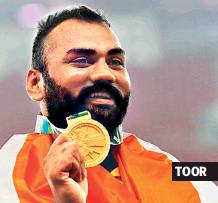
From: August 26, 2018: The Times of India
Man From Moga Gets Record Throw In His Fifth Attempt, Now Wants To Touch 21m
Tajinderpal Singh Toor gave up cricket for shot put at the insistence of his father Karm Singh when he was a child. On Saturday, he justified his cancer-stricken father’s faith in him by winning the gold in shot put here with an Asian Games record.
Left-hander Tajinderpal’s first throw was good enough to win him the top place on the opening day of the athletics competition but he ended the competition in style with the record to claim the first shot put gold for India since 2002 when Bahadur Singh had finished on the top of the podium in the Busan Asian Games.
The 23-year-old’s first throw was19.96m, the second a weak one at 19.15m. His third was a foul and fourth was also 19.96. The record throw came in his fifth attempt, at 20.75, which is his personal best, a new national record and an Asian Games record.
The earlier national record of 20.69m was set six years back by Om Prakash Karhana while the earlier Asian Games record — 20.57m — was set by Sultan Abdulmajeed Al-Hebshi of Saudi Arabia in 2010 at Guangzhou Games. Al-Hebshi was also there in the competition on Saturday, but failed to register a valid throw against his name.
Toor had come to the Asian Games with a mission to set up a personal milestone of 21m. He was hurting after the disappointment of missing out on a medal at the Gold Coast Commonwealth Games. He missed the mark not by a very big margin, but promised to achieve it in his next competition.
The athlete, who competed on Saturday with pain in the left wrist, said he would be rushing back home to be with his ailing father.
Squash
Ghoshal, Dipika, Joshana: bronze medals
Damayanti Dasgupta, August 26, 2018: The Times of India
Injured Ghoshal, Dipika and Joshana settle for bronze
At 32 years of age, this Asian Games was probably the last and best chance for squash ace Saurav Ghoshal to clinch a gold but fate had other plans. India’s top-ranked squash player had come close to winning it in the previous three editions of the quadrennial event but had to eventually settle for bronze at the 2006 Doha and 2010 Guangzhou Games while he won a silver at the 2014 Incheon Games.
On August 25, 2018, an injured Saurav once again had to settle for a bronze when he went down fighting 12-10, 13-11, 6-11, 5-11, 6-11 to lower-ranked Leo Au of Hong Kong China in the semifinals. The 32-year felt a discomfort in his left leg after he landed in Jakarta and the muscle injury only aggravated from there. On Saturday he was in cruise control in the first two games but then his leg cramped up and it was difficult for him to move or put up a fight.
The women too did not have much luck. Both Dipika Pallikal and Joshana Chinappa lost their respective semifinal matches on Friday to also win a bronze for India. Though Dipika lost to defending champion Malaysia’s Nicol David 7-11, 9-11, 6-11, it was an upset defeat for Joshana who failed to match up to her 19-yearold opponent Sivasangari Subramaniam, losing 10-12, 6-11, 11-9, 7-11.
Other results
1
August 24, 2018: The Times of India
India assured themselves of at least a bronze medal in the squash competition as the country’s top ranked squash player Saurav Ghosal will play compatriot Harinder Pal Sandhu in the men’s singles quartefinals. In the women’s singles, both Joshna Chinappa and Dipika Pallikal Karthik also made it to the quarterfinals. Ghosal set aside Sri Lankan opponent Mohomed Ismail Mukthar Wakeel 11-2, 11-2, 11-1. Sandhu beat Ko Youngjo of South Korea.
2
India were assured of three medals in squash competition with Saurav Ghosal, Joshna Chinappa and Dipika Pallikal Karthik advancing to the semifinals of their respective singles events. Saurav beat compatriot Harinder Sandhu 9-11, 11-7, 11-7, 11-7 in men’s singles quarterfinals. Dipika won 11-5, 11-6, 11-8 against Japanese Kobayashi Misaki, while Joshna overcame Hong Kong’s Chan Ho Ling.
3
INDIAN TEAMS MAKE WINNING STARTS IN SQUASH
Both the Indian men’s and women’s teams recorded 3-0 victories in the group stage of the squash team events on Monday. The men beat Indonesia 3-0 in the morning before overwhelming Singapore by the same margin. The women, who had only one match, beat Iran 3-0. In the men’s team, India are seeded second and have Malaysia, Qatar, Singapore, Indonesia and Thailand in the group. In the women’s section, third seed India are clubbed with Hong Kong, China, Iran, Indonesia, Thailand. The top two teams qualify for semifinals from each group.
4
Team:
Men: Pool B: India bt Qatar 2-1;
Women: Pool B: India bt Thailand 3-0; bt Indonesia 3-0.
Swimming
Men’s 50m freestyle
Virdhawal misses 50m bronze by a whisker, August 22, 2018: The Times of India
Virdhawal Khade bettered his national record but missed the bronze medal in the men’s 50m freestyle by a whisker, finishing fourth in the final at the Asian Games here on Tuesday. After finishing third fastest in overall heats, Khade was a medal contender but missed it by hundredth of a second. He clocked 22.47s while Japan’s bronze winner Shunichi Nakao timed 22.46.
China’s Hexin Yu (22.11) won gold ahead of Katsumi Nakamura (22.20). In the morning session, 26-year-old Khade marginally bettered his own long-standing national record by clocking 22.43s which was a better effort than his 22.52s, set in August 2009 at Asian Age group swimming championships in Japan.
Khade returned to swimming only 18 months back after remaining out of action due to his job commitment with the Maharashtra government. He is posted as a Tehsildar at Sanjay Gandhi Niradhar, which manages a social welfare scheme.
Natraj sets national mark twice but finishes sixth
August 24, 2018: The Times of India
Srihari Natraj twice bettered his national record in the 200m backstroke but could finish only sixth in the final while Virdhawal Khade ended last in the 50m butterfly in the swimming competition on Thursday. Natraj moved to the final by improving upon his own national mark with a timing of 2:02.97 and further cut it down to 2:02.83 in the final. Khade clocked 24.09 to top Heat 2, bettering his own nine-year old national record of 24.14 set at the Asian Championship at Foshan, China, but managed only 24.48 in the final.
Other results
1
August 22, 2018: The Times of India
Indian swimmers Sandeep Sejwal, Sajan Prakash and Avinash Mani topped their respective heats but still failed to qualify for the finals of the Asian Games. Sejwal finished first in his heat with a timing of 62.07 but could not make the final of the men’s 100m breaststroke. Sajan Prakash won his heat with a timing of 54.04 in men’s 100m butterfly, while Avinash Mani won in 56.98s. Both the Indian swimmers failed to qualify for the finals
2
August 24, 2018: The Hindustan Times
Sandeep finishes 7th, Page fails to qualify:
Swimmer Sandeep Sejwal finished seventh in the men’s 50m breaststroke, while Advait Page failed to qualify for the 1500m freestyle final. Sandeep, who won a bronze medal in this event at the Incheon Games four years ago, clocked 27.98s, 0.91 seconds behind winner Yasuhiro Koseki of Japan. In the men’s 1500m event, Page, who holds the national record in the category, finished fastest in his heat clocking a time of 15:29:96.
Table tennis
Men: bronze
August 28, 2018: The Times of India
Indian men’s team, bronze, table tennis
(Semi-finals): Men’s team: India lost to South Korea 3-0 (bags bronze).
Bronze is India’s first medal from the sport
PRESS TRUST OF INDIA
The Indian men’s table tennis team settled for a historic bronze medal after losing 3-0 to South Korea in a lop-sided semifinal.
The team comprising G. Sathiyan, Achanta Sharath Kamal and A. Amalraj couldn’t put up a fight against the mighty Koreans, who set up a summit clash against defending champion China in a repeat of 2014.
Sathiyan, ranked 39, suffered a 9-11, 11-9, 11-3, 11-3 loss to Lee Sangsu in the opening game. The onus was then on Sharath Kamal, Word No. 33. But he lost 11-9, 11-9, 6-11, 7-11, 11-8 to Young Sik Jeoung.
In the decider, Amalraj was beaten 11-5, 11-7, 4-11, 11-7 by 22-year-old Woojin Jang.
India had defeated Japan 3-1 in the quarterfinals to assure the country its first-ever Asian Games medal in table tennis. India did not have a single medal in the sport which was introduced in 1958.
''' Earlier result ''' MEN’S TT TEAM ASSURED OF HISTORIC MEDAL The Indian men’s team defeated fancied Japan 3-1 in the quarterfinals to be assured of first-ever medal in table tennis in the history of the Asian Games on Monday. They will play Korea in the semis on Tuesday. Word No. 33 Achanta Sharath Kamal blanked world No. 19 Kenta Matsudaira 11-8, 12- 10, 11-8. Rising star G Sathiyan, ranked 39, won both his singles against 28th ranked Jin Ueda and Matsudaira.
Women
August 26, 2018: The Times of India
The Indian women paddlers made the quarterfinals. The team of Mouma Das, Ayhika Mukherjee and Sutritha Mukherjee defeated Qatar 3-0 in the first match but lost to China 0-3 in the second match. In the third match, they outplayed Iran 3-1 to join China in the quarters. The men’s team won 3-0 against UAE but lost to Chinese Taipei 2-3.
Later, women’s team was knocked out losing 1-3 to Hong Kong in the quarterfinals. Manika Batra stunned world No. 20 Lee Ho Ching in the opening singles but her teammates Ayhika Mukherji and Mouma Das both lost their singles ties.
Tennis
Men’s doubles: Gold
Devadyuti Das, Bopanna & Sharan give golden solace, August 25, 2018: The Times of India
Prajnesh Adds To Ankita’s Bronze After Loss In Semis
The pair of Rohan Bopanna and Divij Sharan managed to turn Incheon silver into gold in the men’s doubles event with a 6-3, 6-4 win over Aleksander Bublik and Denis Yevseyev of Kazakhstan in the final
Men’s singles: bronze
Devadyuti Das, August 25, 2018: The Times of India
Prajnesh Gunneswaran had to settle for bronze in the men’s singles after losing 2-6, 2-6 to Uzbekistan veteran Denis Istomin-.
Women
Ankita settles for bronze, August 24, 2018: The Times of India
Ankita Raina played her heart out against top seed Shuai Zhang before settling for bronze
Against the world number 34 from China and a Grand Slam quarterfinalist, 189th ranked Raina put up a spirited show before eventually losing 4-6, 6-7 (6) in the semifinal that lasted 131 minutes.
The results, analysed
A gold and two bronze medals from tennis is a creditable performance but the Indians will rue missed opportunities — they could have won at least two more medals, including possibly another gold. In the 2014 Incheon Games, India had won five medals.
“I would say the campaign was quite successful since we managed to win a gold and two bronze medals without out top women’s doubles player in Sania Mirza and our top singles player Yuki Bhambri also missing out. However, there is also the disappointment at missing out two medals in the mixed doubles and men’s doubles events (featuring the team of Ramkumar Ramanathan and Sumit Nagal),” Indian team’s captain-coach Zeeshan Ali told TOI from Palembang.
Zeeshan was referring to Bopanna & Ankita Raina’s 4-6, 6-1, 6-10 loss to Indonesian pair of Christopher Rungkat and Aldila Sutjiadi and Ramkumar & Nagal’s 7-5, 4-6, 2-10 loss to eventual finalists Bublik and Yevseyev — both excruciatingly in tie-breakers in quarterfinals. “It was a gutsy performance by Ankita, battling through a really tough field to reach the semifinals, something not many women’s singles players have achieved from India. All the hard work she has managed to put in through the year is starting to show. She carried the weight of competing in three events — singles, doubles and mixed doubles — admirably well ,” Ali said.
Bopanna was pleased to peak at the right time in the Asian Games.
Gunneswaran, ranked 161 on the ATP Tour, had a memorable run in the singles before bowing out to former world No. 33 Istomin. “We dubbed Prajnesh as the marathon man this week. He battled through two really long three-setters in the last two rounds. Especially in the quarterfinals, he played a near three-hour match against Soonwoo Kwon of South Korea. He was cramping up on court on Thursday, battling the harsh humid weather here. He just didn’t have the legs on court on Friday to give fight to someone like Istomin,” Zeeshan felt.
The Indian captain once again highlighted the disruption caused by Leander Paes’s last-minute pullout from the event. “If Leander had decided to come, the second doubles team would have been much more stronger. Till four days before the Asian Games, I was sure that Leander was going to represent India. On hindsight, if I knew earlier, we could have selected a second specialist doubles player and we could have had a better shot at two more medals,” he added.
Other results
1
Ramanathan, Raina advance to pre-quarterfinals:
Singles specialists, including second seed Ramkumar Ramanathan and Ankita Raina, made a smooth start to their campaign. Ramanathan won the first set 6-0 against Wong Hong Kit but was stretched by the Hong Kong player in the second set before getting past 7-6 (4) on tie-break in a round of 32 match. Prajnesh Gunneswaran had it easy against Indonesia Rifqi M Fitriadi, winning 6-2, 6-0 to progress to the last 16. Ankita Raina beat Beatrice Gumulya 6-2, 6-4 in a round of 32.
2
August 23, 2018: The Times of India
Ankita Raina and top seeds men’s doubles pair of Rohan Bopanna and Divij Sharan assured India of at least a couple of bronze medals in the tennis competition by progressing to the semifinals of the Asian Games. World no. 189 Raina dispatched Hong Kong’s Eudice Chong 6-4, 6-1 to enter the last four of the women’s singles competition. Bopanna and Sharan played a solid match against the seasoned pairing of Yang Hsieh and Yang Tsung-Hua of Chinese Taipei 6-3, 5-7, 10-1. The Indian mixed pair of Bopanna and Raina beat Wong Chun Hun and Eudice Chong of Hong Kong 6-4, 6-4 to enter the quarterfinals.
3
Rohan Bopanna and Divij Sharan used all their experience to bounce back and enter the men’s doubles final of the Asian Games, here on Thursday. Sharan and Bopanna are assured of at least a silver but will be going for gold in the final. Another medal was assured when world number 161 Prajnesh Gunneswaran outlasted 273rd ranked Kwon Soonwoo of South Korea 6-7 (2 ), 6-4, 7-6 (8) in a marathon quarterfinal lasting almost four hours. Bopanna and Sharan fought it out on court one against the Japanese pairing of Shimbakuro S and Uesugi Kaito.
Having lost the first set 4-6, Bopanna and Sharan had to try something different and they switched sides before emerging 6-3, 10-8 in the next two sets.
Bopanna and Raina, however, lost to their mixed doubles quarterfinal match against the Indonesian duo of Christopher Benjamin Rungkat and Aldila Sutjiadi 4-6, 6-1, 6-10.
Volleyball
Men
Quarterfinal for 7-12: Pakistan bt India 21-25, 25-21, 25-21, 25-23.
Women
August 27, 2018: Business Standard
WOMEN’S VOLLEYBALL TEAM LOSES TO CHINA
The Indian women’s team ended its campaign at the Asian Games, losing 0-3 to China in the last Pool B match of the volleyball competition on Monday. In a 67-minute match, India lost 18-25, 19-25, 9-25. It was India’s fifth straight loss at the Games.
Weightlifting
Other results
August 25, 2018: The Indian Express
Rakhi Halder fails to finish lift: India’s poor show in the Asian Games weightlifting continued as Rakhi Halder failed to register even a single lift in the women’s 63kg category here. The 25-year-old failed to clear her snatch section of the competition. Setting an entry weight of 93kg, Halder was unable to lift it in her three attempts. Earlier this year, she had lifted a total of 230kg (102kg+128) in the Senior National Championships to create a national record.
Wrestling
Women’s wrestling was introduced at the Games in 2002 in Busan.
Men’s 65kg
Biswajyoti Brahma, August 21, 2018: The Times of India
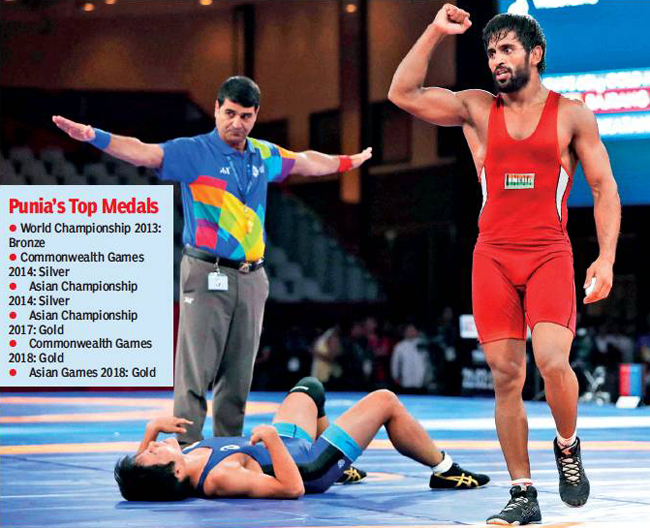
A list of Punia's top medals, 2013-18
From: Biswajyoti Brahma, August 21, 2018: The Times of India
Bajrang Punia , who had virtually faced no resistance in all his bouts till the final of the men’s 65kg category, was stretched till the end by Japan’s Takatani Daichi. The Indian survived some anxious moments to ultimately emerge the winner [gold].
Women’s 50kg: gold
Biswajyoti Brahma, August 21, 2018: The Times of India
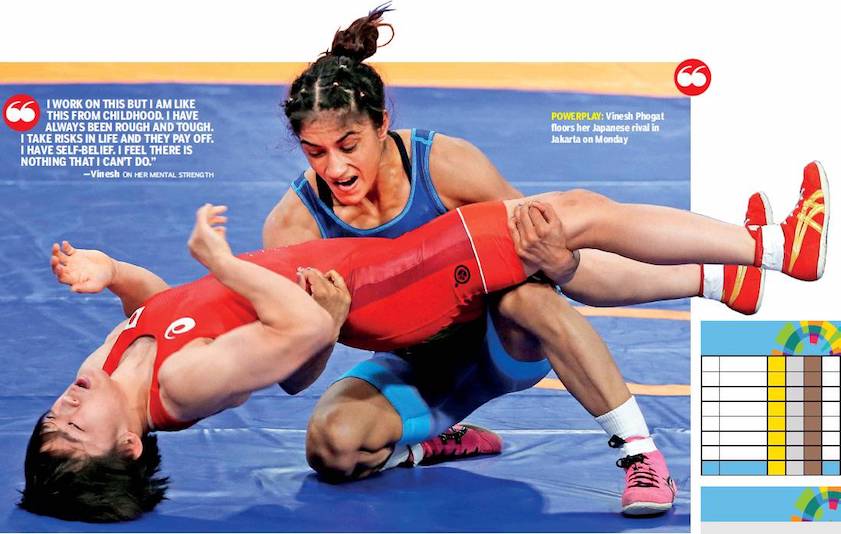
From: Biswajyoti Brahma, August 21, 2018: The Times of India
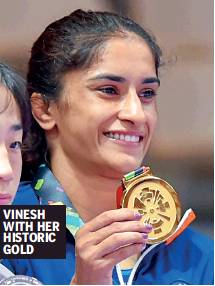
From: Biswajyoti Brahma, August 21, 2018: The Times of India
Vinesh Phogat, from the Haryanvi stable of wrestling sisters of ‘Dangal’ fame, came up with a nearperfect game to clinch a historic gold, the first in for an Indian woman in wrestling in Asian Games. She outclassed Yuki Irie of Japan 8-2 in the 50kg category final.
It turned out to be a disappointing day for other Indian wrestlers as Pinki in failed to impress 53 kg category, while Olympic medallist Sakshi Malik (62kg), Pooja Dhanda (57kg) and Sumit (125kg) lost the chance to win bronze medals through repechage.
Women’s 68kg: bronze
August 22, 2018: The Times of India
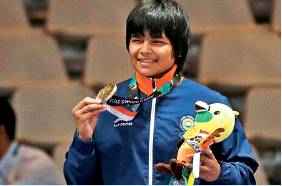
From: August 22, 2018: The Times of India
Divya Kakran shrugged off a crushing quarterfinal defeat to bag a bronze, ensuring that medals continued to come from the wrestling arena, even as three other Indians crashed out early at the Asian Games.
Kakran was demolished by the experienced Mongolian Tumentsetseg Sharkhuu in the quarterfinals of the 68kg category but the Delhi athlete was lucky she did not have to come through a repechage to be in contention for bronze. The draw was such that she was pitted against Chinese Taipei’s Chen Wenling without playing a repechage round and won the bout in just one minute 29 seconds by technical superiority.
Divya had won a bronze at the 2018 Gold Coast CWG and silver at the recently-held Asian Junior Championship in New Delhi.
Other results
August 21, 2018: Business Standard
Three other wrestlers could not reach the medal round. Kiran was ousted from 76kg. The Greco Roman competition started on Tuesday but India did not have anything to cheer about. Gyanender lost in the 60kg while Manish was ousted from 67kg competition. Harpreet Singh is now India’s best bet in Greco Roman.
Wushu
August 23, 2018: The Times of India

From: August 23, 2018: The Times of India
All the four Indian wushu players lost their semifinal bouts to settle for bronze medals on Wednesday but ensured that the country produced its best-ever performance in the Asian Games. Naorem Roshibini Devi, Santosh Kumar, Surya Bhanu Partap Singh and Narender Grewal lost their Sanda event semifinal bouts but in the process gave the Indian team an unprecedented four medals in the Asian Games.
Before this edition, India had taken part in the 2006, 2010 and 2014 Asian Games and this four medal haul has been the best so far. In 2014 Incheon, India had won two bronze with Grewal clinching one in men’s Sanda 60kg.
Thus for Grewal, this bronze is his second medal in the Asian Games. In the 2006 and 2010 Asian Games, India had won one (bronze) and two (one silver, one bronze) medals respectively. Roshibini Devi was the first to take the field in women’s Sanda 60kg semifinals and she lost to Cai Yingying of China 0-1.
Next up was Santosh Kumar in men’s Sanda 56kg category but he was no match to Truong Giang Bui of Vietnam as he lost 0-2 in the semifinal bout. Any hopes of an Indian wushu player appearing in the finals on Thursday went up in smokes as Partap Singh (men’s Sanda 60kg) and Grewal (men’s Sanda 65kg) lost their semifinal bouts.
Partap Singh lost to Erfan Ahangarian 0-2 while Grewal was beaten by Akmal Rakhimov of Uzbekistan by the same margin.
Indian contingent
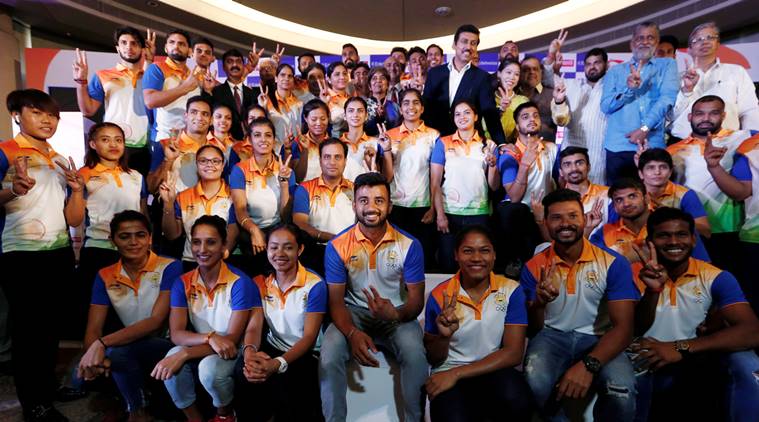
From: Asian Games 2018: India’s full contingent for Asian Games in Indonesia, August 15, 2018: The Indian Express
India Asian Games Squad for Archery
Men
Recurve: Atanu Das, Jagdish Chaudhary, Sukhchain Singh, Vishwas
Compound: Abhishek Verma, Rajat Chauhan, Sangamprit Bisla, Aman Saini
Women
Recurve: Promila Daimary, Deepika Kumari, Ankita Bhakat, Laxmirani Majhi
Compound: Trisha Deb, Jyothi Surekha Vennam, Madhumita Kumari, Muskan Kirar
India Asian Games Squad for Athletics
Men
Track Events
200m – Mohammed Anas
400m– Arokiarajiv, Mohammed Anas
800m – Jinson Johnson, Manjit Singh
1500m – Jinson Johnson, Manjit Singh
5000 m – G Lakshmanan
10000 m – G Lakshmanan
4x400m relay– Dharun Ayyasamy, Mohammed Anas, Jeevan Karekoppa Suresh, Jithu Baby, Arokiarajiv, Kunhu Mohammed Puthanpurakkal
400m Hurdles – Dharun Ayyasamy, Santosh Kumar
3000m Steeplechase – Shankar Lal Swami
Field Events
Triple Jump – Arpinder Singh, Rakesh Babu AV
Javelin Throw – Shivpal Singh, Neeraj Chopra
Long Jump – Sreeshankar
High Jump – Chethan Balasubramanya
Shot Put – Tajinderpal Singh Toor, Naveen Chikara
Road Events
20 km Walk – Manish Singh Rawat, KT Irfan
50 km Walk – Sandeep Kumar
Women
Track Events
100m – Dutee Chand
200m – Dutee Chand, Hima Das
400m – Hima Das
800m – Tintu Luka
1500m – PU Chitra, Monika Chaudhary
5000m – Sanjivani Jadhav, Suriya Longanathan
10000m – Sanjivani Jadhav, Suriya Longanathan
4x400m relay – Jisna Mathew, MR Poovamma, Saritaben Laxmanbhai Gayakwad, Sonia Baishya, Vijayakumari
400m Hurdles – Jauna Murmu, Anu Raghavan
3000m Steeplechase – Sudha Singh, Chinta Yadav
Field Events
Hammer Throw – Sarita Romit Singh
Discus Throw – Sandeep Kumari, Seema Punia
Javelin Throw – Annu Rani
Long Jump – Nayana James, Neena Varakil
Road Events
20km Walk – Soumya Baby, Khushbir Kaur
Combined Events
Heptathlon – Purnima Hembram, Swapna Barman
Mixed
4x400m mixed relay – Kunhu Mohammed Puthanpurakkal, Arokiarajiv, Mohammed Anas, Hima Das, MR Poovamma
India Asian Games Squad for Badminton
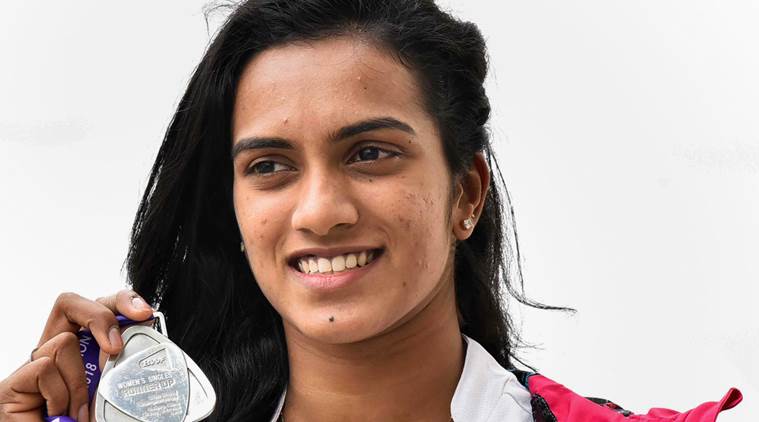
From: Asian Games 2018: India’s full contingent for Asian Games in Indonesia, August 15, 2018: The Indian Express
Men
Singles – Kidambi Srikanth, HS Prannoy
Doubles – Satwiksairaj Rankireddy, Chirag Shetty, Manu Attri, Sumeeth Reddy
Women
Singles – PV Sindhu, Saina Nehwal
Doubles – Ashwini Ponnappa, N Sikki Reddy; Rutaparna Panda, Arathi Sara Sunil
Mixed double
Satwiksairaj Rankireddy, Sumeeth Reddy, Pranav Jerry Chopra, N Sikki Reddy, Satwiksairaj Rankireddy, Ashwini Ponnappa
Team – Kidambi Srikanth, HS Prannoy, B Sai Praneeth, Sameer Verma, Satwiksairaj Rankireddy, Chirag Shetty, Manu Attri, Sumeeth Reddy, Pranav Jerry Chopra, PV Sindhu, Saina Nehwal, N Sikki Reddy, Ashwini Ponnappa, Sourabh Verma, Sai Uttejitha Rao, Ashmita Chaliha, Rutaparna Panda, Arathi Sara Sunil, Aakarshi Kashyap, Gayathri Gopichand
India Asian Games Squad for Basketball
Women’s Team 5X5: Nisha Sharma, Pushpa Senthil Kumar, Prasannan Geetha Anjana, Hemmige Mahesha Bhandavya, Palanilkumakalayil Skaria Jeena, Rajapriyadharshini Rajaganapathi, Raspreet Sidhu, Shireen Limaye, Priyanka Prabhakara, Madhu Kumari, Sangeeta Kaur, Stephy Nixon
India Asian Games Squad for Boxing
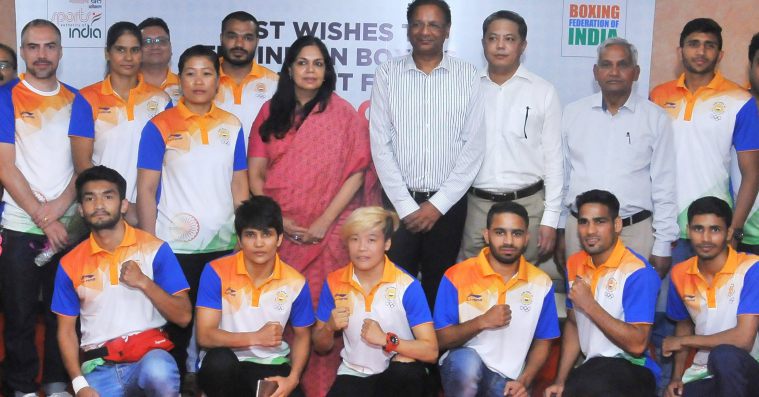
From: Asian Games 2018: India’s full contingent for Asian Games in Indonesia, August 15, 2018: The Indian Express
Men
Light Flyweight (49 kg) – Amit Panghal
Flyweight (52 kg) – Gaurav Solanki
Bantamweight (56 kg) – Mohammad Hussamuddin
Lightweight (60 kg) – Shiva Thapa
Light Welterweight (64 kg) – Dheeraj Rangi
Light Welterweight (69 kg) – Manoj Kumar
Middleweight (75 kg) – Vikas Krishan Yadav
Women
Flyweight (51 kg) – Sarjubala Devi
Featherweight (57 kg) – Sonia Lather
Lightweight (60 kg) – Pavitra
India Asian Games Squad for Bowling
Men
Trios: Dhruv Sarda, Shabbir Dhankot, Akaash Ashok Kumar; Parvez Ahmed Saud, Ramachandraiah Kishan, Shoumick Datta
Team of 6: Dhruv Sarda, Shabbir Dhankot, Aakaash Ashok Kumar, Parvez Ahmed Saud, Kishan Ramachandriah, Shoumick Datta
Masters: Parvez Ahmed Saud, Shoumick Datta
India Asian Games Squad for Bridge
Men
Pranab Bardhan, Sapan Desai, Subhash Gupta, Rajeev Khandelwal, Ajay Khare, Finton Lewis, Debabrata Majumder, Gopinath Manna, Sumit Mukherjee, Shibhnath Dey Sarkar, Bachiraju Satyanarayana, Jaggy Shivdasani, Arun Kumar Sinha, Rajeshwar Tewari and Raju Tolani.
Women
Rita Choksi, Feroza Chothia, Hema Deora, Bharati Dey, Marianne Karmarkar, Himani Khandelwal, Kiran Nadar, Aparna Sain and Vasanti Shah.
India Asian Games Squad for Cande-Kayak
Men
Sprint: Chingching Singh Arambam, Albert Raj Selvaraj, Naocha Singh Laitonjam, Prohit Baroi, Jamesboy Singh Oinam, Gaurav Tomar, Prakant Sharma, Sunil Singh Salam
Traditional Boat Race: Bijender Singh, Ravinder, Sivasankar Thayyil Baburaj, Manmohan Dangi, Dilip singh Negi, Abhay Singh, Arun Nandal, Suraj Singh Negi, Ankit Pachori, Satypal Tomar, Kiran Singh Moirangthem, Hariom Kurmi, Sachin Kumar, Parminder Singh, Manjeet Singh, Heisnam Nganba Meitei
Women
Sprint: Ragina Kiro, Sandhya Kispotta, Soniya Devi Phairembam, Meena Devi Laishram, Inoacha Devi M, Anjali Bashisht, Meera Das
Slalom: Aarti Pandey, Champa Mourya
Traditional Boat Race: Rajeshwari Kushram, Sanjana Singh, Nazis Mansoori, Dimita Devi Toijam, Manju, Oinam Yaiphabi Devi, Sushila Chanu Shoibam, Aarti Nath, Neetu Varma, Thajamanbi Chanu, Sarju Devi Kojenbam, Yumnam Shamashakhi Devi, Menu, Manisha Rani, Kirti Kewat, Ramkanya Dangi.
India Asian Games Squad for Cycling
Men
Ranjit Singh, Manjeet Singh, Raju Bati, Manohar Lal, A. Bike Singh, Rajbeer Singh, Esow, Appolonious and Dilawar
Women
Deborah Herold, Aleena Reji, M. Sonali Chanu, T. Manorama Devi, Nayana Rajesh Priyadarshini, E. Chaoba Devi and Megha Gugad
India Asian Games Squad for Equestrian
Men
Ashish Malik, Rakesh Kumar, Jitender Singh, Fouaad Mirza, Kaevaan Kevic Setalvad, Chetan Reddy Nukala
India Asian Games Squad for Fencing
Women
Thoudam Kabita Devi, Ena Arora, Jas Seerat Singh, Jyotika Dutta
India Asian Games Squad for Gymnastics

From: Asian Games 2018: India’s full contingent for Asian Games in Indonesia, August 15, 2018: The Indian Express
Men
Individual/Team: Rakesh Patra, Yogeshwar Singh, Gaurav Kumar, Ashish Kumar, Siddharth Verma
Women
Individual/Team: Dipa Karmakar, Pranati Das, Aruna Reddy, Mandira Chowdhury, Pranati Nayak
India Asian Games Squad for Golf
Men
Individual/Team: Kshitij Naveed Kaul, Harimohan Singh,Rayhan Thomas, Aadil Bedi
Women
Individual/Team: Diksha Dagar, Ridhima Dilawari, Sifat Sagoo
India Asian Games Squad for Handball
Men Team
Kamaljeet Singh, Bajrang Thakur, Atul Kumar, Harender Singh, Sachin Kumar Bhardwaj, Karamjeet Singh, Deepak, Davinder Singh, Harjinder Singh, Navdeep, Naveen, Ramesh Chand, Avin Khatkar, Adithya Nagaraj, Rahul Dubey, Greenidge Dcunha
Women Team
Diksha Kumari, Kajal, Nina Shil, Nidhi Sharma, Deepa, Ritu, Sushma, Indu Gupta, Maninder Kaur, Sanjeeta, Priyanka Thakur, Jyoti Shukla, Banita Sharma, KM Manjula Pathak, Khila Devi, Rimpi
India Asian Games Squad for Hockey
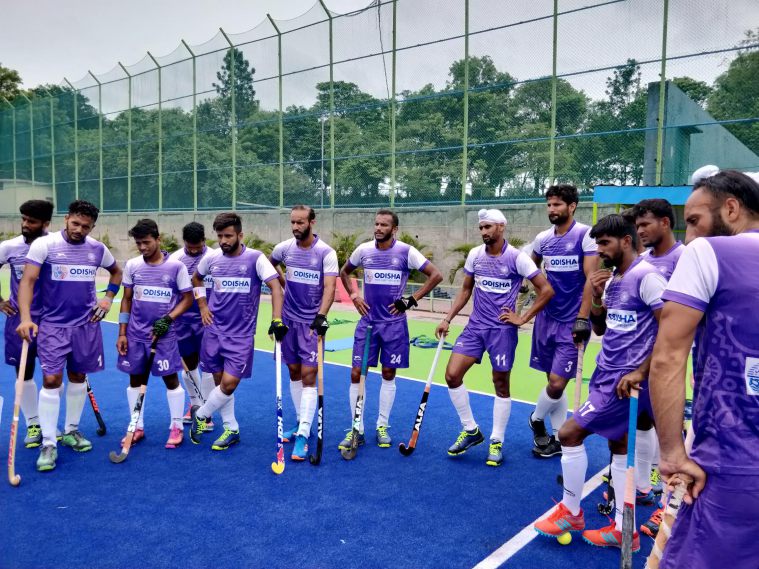
From: Asian Games 2018: India’s full contingent for Asian Games in Indonesia, August 15, 2018: The Indian Express
Men Team
PR Sreejesh (Captain), Chinglensana Singh Kangujam (Vice-Captain), Krishan B Pathak, Harmanpreet Singh, Varun Kumar, Birendra Lakra, Surender Kumar, Rupinder Pal Singh, Amit Rohidas, Manpreet Singh, Simranjeet Singh, Sardar Singh, Vivek Sagar Prasad, SV Sunil, Mandeep Singh, Akashdeep Singh, Lalit Kumar Upadhyay, Dilpreet Singh
Women Team
Rani Rampal (Captain), Savita (Vice-Captain), Rajani Etimarpu, Deep Grace Ekka, Sunita Lakra, Deepika, Gurjit Kaur, Reena Khokhar, Namita Toppo, Lilima Minz, Monika, Udita, Nikki Pradhan, Neha Goyal, Vandana Katariya, Lalremsiami, Navneet Kaur, Navjot Kaur
India Asian Games Squad for Judo
Men
Vijay Kumar Yadav, Harshdeep Singh Brar, Avtar Singh
Women
Th. Kalpana Devi, Garima Chaudhary, Rajwinder Kaur
India Asian Games Squad for Kabaddi
Men Team
Ajay Thakur (captain), Pardeep Narwal, Monu Goyat, Rishank Devadiga, Rahul Chaudhari, Rohit Kumar, Girish Ernak, Surender Nada, Deepak Niwas Hooda, Manjeet Chillar, Surjeet Singh Narwal, Rajulal Chaudari, Sandeep Narwal, Mohit Chillar.
Women Team
Sakshi Kumari, Kavita Devi, Priyanka, Manpreet Kaur, Payel Chowdhury, Ritu Negi, Sonali Vishnu Shingate, Sayali Sanjay KeriPale, Randeep Kaur Khehra, Shalini Pathak, Usha Rani Narasimhalah, Madhu. Standby: Priyanka, Shama Parveen
India Asian Games Squad for Karate
Men
Jayendran Sharath Kumar, Vishal
India Asian Games Squad for Martial Arts (Kurash)
Men
Jatin, Jacky Gahlot, Kunal, Manish Tokas, Divesh, Danish Sharma, Parikshit Kumar, Ashwin Pandari Chandran
Women
Pincky Balhara, Malaprabha Yallappa Jadhav, Binisha Nayakattu Biju, Megha Tokas, Jyoti Tokas, Amisha Tokas
India Asian Games Squad for Martial Arts (Pencak Silat)
Men
Boynao Singh Naorem
Women
Sonia, Simran
India Asian Games Squad for Rollersports
Men
Amitesh Mishra, Harshveer Singh Sekhon
Women
Aarathy Kasturi Raj, Varsha Puranik
India Asian Games Squad for Rowing
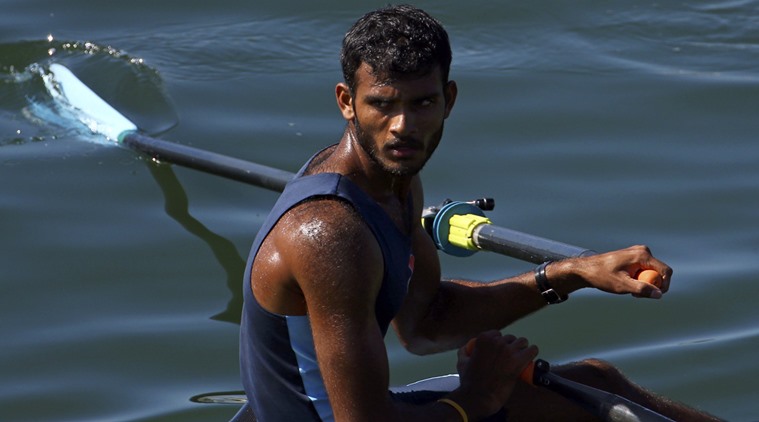
From: Asian Games 2018: India’s full contingent for Asian Games in Indonesia, August 15, 2018: The Indian Express
Men
Dattu Baban Bhokanal, Sawarn Singh, Om Prakash, Sukhmeet Singh, Monu, Arjun Lal Jat, Malkeet Singh, Gurinder singh, Dushyant, Rohit Kumar, Bhagwan Singh, Jagvir Singh, Tejash Shinde Hanamant, Jegan Sekhar, Bhopal Singh, Manish Yadav, Hardeep Singh, N. Pranay Ganesh, Rahul Giri, Pandu Rang, Lucky, Akshat, M. Lakshman Rohith, Sumith, Sono Laxmi Narayan, Arvind Singh and Manpreet Singh.
Women
Navneet Kaur, Yamini Singh, Harpreet Kaur, Annu, Sanjukta Dung Dung, Sayali Shelke and Pooja Sangwan.
India Asian Games Squad for Sailing
Men
Govind Bairagi, Dayna Edgar Coelho, Varun Ashok Thakkar, Ganpathy Kelapanda
Women
Katya Ida Coelho, Nethra Kumanan, Sweta Shervegar, Harshita Tomar, Varsha Gautham
India Asian Games Squad for Sepak Takraw
Men
Niken Singh Khangembam, Sandeep Kumar, Malemnganba Singh Sorokhaibam, Seitaram Singh Thokchom, Henary Singh Wahengbam, Sanjeck Singh Waikhom, Akash Yumnam, Harish Kumar, Lalit Kumar, Ngathem Jotin Singh, Dheeraj, Gurumayum Jiteshor Sharma
Women
Tharangini Annam, Dolly Srivastava, Maipak Devi Ayekpam, Khushbu, Manisha Kumari, Nganthoi Chanu Yanglem, Aruna Devi Mutum, Chaoba Devi Oinam, Linthoingambi Chanu Pangambam, Rashmi, Ronita Devi Elangbam, Jwensinle Kesen
India Asian Games Squad for Shooting
Men
Rifle
50m Rifle 3 Positions – Sanjeev Rajput, Akhil Sheoran
10m Air Rifle – Ravi Kumar, Deepak Kumar
300m Standard Rifle 3 Positions – Harjinder Singh, Amit Kumar
Pistol
10m Air Pistol – Abhishek Verma, Saurabh Chaudhary
25m Rapid Fire Pistol – Shivam Shukla, Anish
Shotgun
Trap – Lakshay, Manavjit Singh Sandhu
Skeet – Sheeraz Sheikh, Angadwir Singh Bajwa
Double Trap – Ankur Mittal, Shradul Vihaan
Women
Rifle
50m Rifle 3 Positions – Anjum Moudgil, Gaayathri N
10m Air Rifle – Apurvi Chandela, Elavenil Valarivan
Pistol
10m Air Pistol – Manu Bhaker, Heena Sidhu
25m Pistol – Manu Bhaker, Rahi Sarnobat
Shotgun
Trap – Shreyasi Singh, Seema Tomar
Skeet – Ganemat Sekhon, Rashmmi Rathore
Double Trap – Shreyasi Singh, Varsha Varman
Mixed
10m Air Rifle Mixed Team – Ravi Kumar, Apurvi Chandela
10m Air Pistol Mixed Team – Abhishek Verma, Manu Bhaker
Trap Mixed – Lakshay, Shreyasi Singh
India Asian Games Squad for Squash
Men
Saurav Ghosal, Harinder Pal Sandhu, Ramit Tandon, Mahesh Mangaonkar
Women
Joshna Chinappa, Dipika Pallikal, Sunayna Kuruvilla, Tanvi Khanna
Team: Saurav Ghosal, Harinder Pal Sandhu, Joshna Chinappa, Dipika Pallikal
India Asian Games Squad for Swimming
Men
Sajan Prakash, Aaron Agnel D’Souza, Virdhawal Khade, Sandeep Sejwal,Advait Page, Srihari Nataraj, Anshul Kothari, Arvind Mani, Avinash Mani, Neel Roy, Sidharth Bajrang Pardeshi, K Ramananda Sharma
India Asian Games Squad for Sport Climbing
Men
Chingkheinganba Maibam, Bharath Stephen Pereira Kamath
Women
Shreya Sanjay Nankar
India Asian Games Squad for Tennis
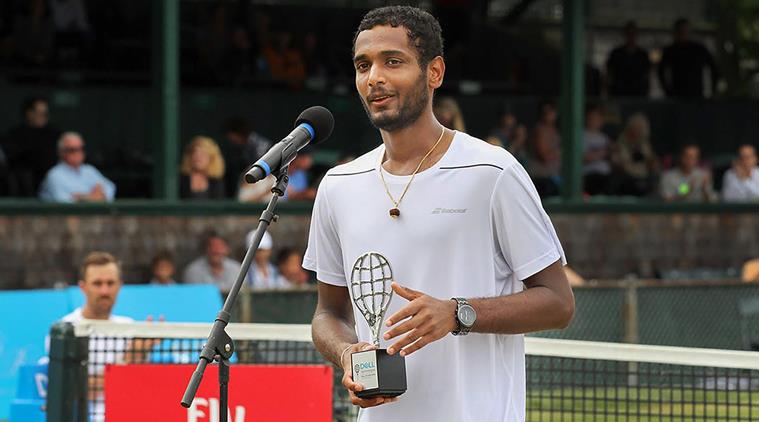
From: Asian Games 2018: India’s full contingent for Asian Games in Indonesia, August 15, 2018: The Indian Express
Men
Singles: Prajnesh Gunneswaran, Ramkumar Ramanathan
Doubles: Sumit Nagal, Leander Paes, Rohan Bopanna, Divij Sharan
Women
Singles: Karman Kaur Thandi, Ankita Raina
Doubles: Pranjala Yadlapalli, Prarthana Thombare, Riya Bhatia, Rutuja Bhosale
Mixed doubles: Leander Paes, Rohan Bopanna, Ankita Raina, Prarthana Thombare
India Asian Games Squad for Taekwondo
Men
Navjeet Maan, Akshay Kumar
Women
Kashish Malik, Anamika Walia, Latika Bhandari, Mamta Kumari Shah, Rodali Barua, Shilpa Thapa
India Asian Games Squad for Soft Tennis
Men
Rohit Dhiman, Jay Meena, Jitender Mehlda, Aniket Chirag Patel, Kamlesh Kumar Shukla
Women
Abhilasha Mehra, Namita Seth, Saayana Sreedetha Prakash, Aadhya Tiwari, Shubh Gulati
India Asian Games Squad for Table Tennis
Men
Singles: Achanta Sharath Kamal, Sathiyan Gnanasekaran
Women
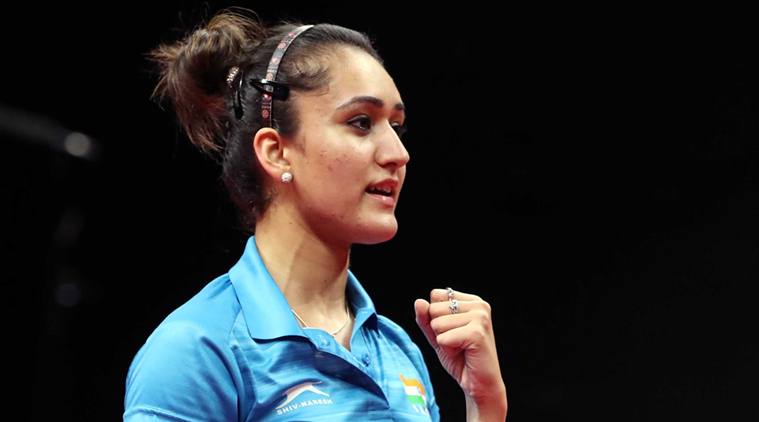
From: Asian Games 2018: India’s full contingent for Asian Games in Indonesia, August 15, 2018: The Indian Express
Singles: Manika Batra, Mouma Das
Mixed doubles
Achanta Sharath Kamal, Anthony Amalraj, Manika Batra, Madhurika Patkar
Team
Achanta Sharath Kamal, Anthony Amalraj, Sathiyan Gnanasekaran, Harmeet Desai, Manav Thakkar, Manika Batra, Mouma Das, Sutirtha Mukherjee, Ayhika Mukherjee, Madhurika Patkar
India Asian Games Squad for Volleyball
Men Team
Akhin Gopala Ammal, Ashok Karthik, Deepesh Kumar Sinha, Prabagaran, Amit, Ajithlal Chandran, Rohit Kumar, Gurinder Singh, Jerome Vinith Charles, Vinit Kumar, Ranjit Singh, Ukkrapandian Mohan, Prabakaran Pattani, Pankaj Sharma
Women Team
Anju Balakrishnan, Soorya, Anusri Ghosh, Aswani Kandoth, Nirmala, Rekha Sreesailam, Anusree Kambrath Poyilil, Sruthi Murali, Minimol Abraham, Anjali Babu, Jini Kovat Shaji, Ruksana Khatun, Priyanka Khedkar, Aswathi Raveendran
India Asian Games Squad for Weightlifting
Men
Sathish Kumar Sivalingam (77 kg), Ajay Singh (77 kg); Vikas Thakur (94 kg)
Women
Rakhi Halder (63 kg)
India Asian Games Squad for Wrestling
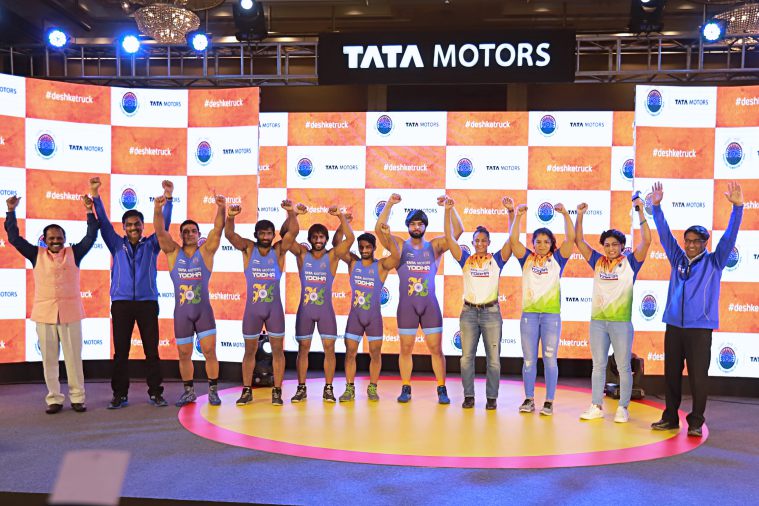
From: Asian Games 2018: India’s full contingent for Asian Games in Indonesia, August 15, 2018: The Indian Express
Men
Freestyle
Sandeep Tomar – 57 kg
Bajrang Punia – 65 kg
Sushil Kumar – 74 kg
Pawan Kumar – 86 kg
Mausam Khatri – 97 kg
Sumit Malik – 125 kg
Greco-Roman
Gyanender – 60 kg
Manish – 67 kg
Gurpreet Singh – 77 kg
Harpreet Singh – 87 kg
Hardeep – 97 kg
Naveen – 130 kg
Women
Freestyle
Vinesh Phogat – 50 kg
Pinki – 53 kg
Pooja Dhanda – 57 kg
Sakshi Malik – 62 kg
Divya Kakran – 68 kg
Kiran – 76 kg
India Asian Games Squad for Wushu
Men
Santhosh Kumar, Surya Singh, Narender Grewal, Pardeep Kumar, Mayanglambam Singh, Anjul Namdeo, Mayanglambam Suraj Singh, Chirag Sharma, Sajan Lama, Mayanglambam Meitei
Women
Sanathoi Yumnam, Roshibina Naorem, Sanatombi Leimapokpam
See also
Asian Games and India: 1951- onwards
Asian Games and India: 2018